Category: Liberalism
September 20th, 2017 by geoffhodgson1946

Geoffrey M. Hodgson
I was born in 1946. I lived in a council house until I was 16. My family were Labour. My privilege was not money, but that my parents and grandparents all valued education and culture. But none of them obtained a university degree, because they were less accessible at the time.
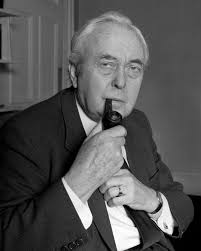
Harold Wilson
I became involved in the Labour Party in 1964 and then saw myself as a Tribune socialist following the steps of great radicals such as Michael Foot. After welcoming Harold Wilson’s election victory in 1964, I became critical of the new Prime Minister because of his nominal support for the US in the Vietnam War.
Vietnam and Marxism
For my baby-boom generation, the Vietnam War was a great generator of radicalism. Like many of my university friends, I became a Marxist in 1966. We were drawn into a turbulent and exciting world that combined activism with ideas and debate. I saw myself as a Marxist until about 1980.
I studied mathematics and philosophy from 1965 to 1968 and economics from 1972 to 1974. Both periods were at the University of Manchester. In the intervening years I taught myself Marxist economics. My knowledge of economics became enduringly significant in my political evolution.
 I was at the LSE student occupation in 1967 and one of the Grosvenor Square demonstrations in 1968. In that year I copied Bertrand Russell and tore up my Labour Party membership card in protest against US aggression in Vietnam.
I was at the LSE student occupation in 1967 and one of the Grosvenor Square demonstrations in 1968. In that year I copied Bertrand Russell and tore up my Labour Party membership card in protest against US aggression in Vietnam.
Marxists dominated the activists on the university campuses. The left was divided and fractious. There were Soviet Bloc loyalists in the Communist Party of Great Britain. There were lovers of Mao Zedong and several rival Trotskyist sects. I could not bring myself to support any totalitarian regime – East or West – so I joined the forerunner of what is now the Socialist Workers’ Party, which saw everything existing as “capitalist”.
My departure from the SWP came in 1971 when they expelled a dissident faction with which I sympathised. (That critical faction eventually became the Alliance for Workers’ Liberty, of Momentum fame in the Corbyn Era.)
I flirted briefly with the International Marxist Group, which included glamorous figures such as Tariq Ali, and Robin Blackburn of the New Left Review. The IMG was stronger in its support for the women’s movement and for gay rights.
After a few years among the sects I could see that something was wrong. These groups were aiming to help create a much better society, but they were generally dogmatic and intolerant. Some were ruthless, pugnacious and fanatical. I did not want to see any social system facilitated or run by these people.

But on the other hand I then accepted the Marxist view that capitalism was exploitative and frequently led to oppression and war. The evidence of this was seemingly before our eyes.
Re-joining Labour and changing strategy
After Labour’s electoral defeat in 1970, there was a strong and growing left in the Labour Party and that seemed the best hope for socialists. Against the advice of Ralph Miliband (whom I knew personally) and others, I re-joined Labour in 1974.
In 1975 I published a pamphlet entitled Trotsky and Fatalistic Marxism. This tried to explain the fanaticism and intolerance of many Marxists in terms of their belief in the imminent decay and collapse of capitalist democracies. Trotskyists had failed to appreciate the enormous expansion and dynamism of capitalism after 1945. Their explanations of the survival of capitalism were weak.
Published in 1977, a longer work entitled Socialism and Parliamentary Democracy elaborated more of my thinking. Marxist-Leninists believed that parliament and the capitalist state should be “smashed”. Influenced by Max Weber and others, I argued that in modern democracies, government drew their perceived legitimacy from parliamentary elections. If socialism became a majority view, then socialists could and should gain a majority in parliament.
In the book I criticised the 1968 revolutionary movement in France for boycotting the elections called by President Charles de Gaulle in that year. Victory in the elections gave de Gaulle legitimacy. The huge movement of students and workers was crushed.

Paris – May 1968
As I had anticipated, my heresies were dismissed out of hand by the far left sects. But the book proved to be rather influential in the UK and internationally. It received a strongly sympathetic hearing on the Labour left. It was translated into Italian, Japanese, Spanish and Turkish. It persuaded a leading member of the violent Basque separatist group ETA to abandon terrorism.
I don’t know if he read my book, but Daniel Cohn-Bendit, the leader of the revolutionary movement in France in May 1968, later argued that it had been a mistake to boycott the French parliamentary elections.
Labour had been reconciled to the parliamentary road to socialism since its formation. The sects argued that it wouldn’t work. My response was that insurrection would not work either. In democracies we needed a combination of parliamentary and extra-parliamentary action.
Questioning ends as well as means
The killing fields in Cambodia affected me deeply. After seizing power in 1975 the Khmer Rouge forced everyone into the countryside and obliterated about two million people – a quarter of the Cambodian population – in the pursuit of their communist utopia.
I could not dismiss this as an aberration. After all, the Khmer Rouge aims, which included the abolition of money, private property and markets, were central to the Communist Manifesto by Karl Marx and Frederick Engels.

Khmer Rouge Killing Fields
The far left were able to publish papers and debate ideas because they lived in a democracy that tolerated freedom of expression. But the ideas and actions of the sects, if they gained influence or power, would curtail these very liberties upon which they had depended.
Crucially, I was not naïve enough to believe that freedom and political pluralism could be guaranteed simply by the goodwill of a more enlightened Marxist leadership, who valued these things more than the Khmer Rouge. Good intentions were not enough.
I had retained a good lesson from Marxism. Effective ideas and practices draw their strength from agglomerations of power sustained by the structures of the politico-economic system. Hence a genuinely pluralist and tolerant political sphere depended on pluralism and decentralisation in the economic domain. A pluralist polity requires a pluralist economy.
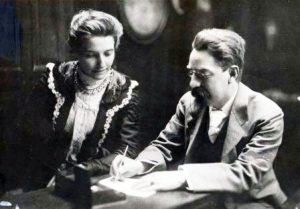
Beatrice & Sidney Webb
Prominent Labour thinkers such as Beatrice Webb, Sidney Webb and G. D. H. Cole had all argued for a decentralised socialist system. But they still sought the abolition of private property and markets. The state would ultimately own everything. So what institutional, legal or other politico-economic forces could stop it retrieving all delegated powers to the centre, when deemed required, or when goodwill wore thin?
Any viable socialism always needs markets
I came to the view that genuine and lasting decentralisation would depend on the existence of organisations with some genuine autonomy and legal independence, providing powers to own property and trade with other organisations. Any viable socialism would always need markets – it was not simply a matter of tolerating or compromising with them.
This crucial transition of my thinking occurred between 1977 and 1980. I cannot recall the detailed influences. But I am sure that the initial impetus did not come from Ludwig von Mises or Friedrich Hayek. I did not delve deeply into their works until the early 1980s.

János Kornai
There had been several socialist proposals to nationalise the sector producing capital goods but retain competition and markets for consumer goods. I was more attracted by the Hungarian economist János Kornai’s more sophisticated proposal (originally published in 1965) to use a dynamic combination of markets and planning, where planning provided strategic impetus, and markets signalled information and gave scope for innovation and planning adjustment.
Over the new year of 1979-1980 I went on a short tourist group visit to the Soviet Union. Some of my companions were dewy-eyed admirers of the system, but I was prepared for its flaws, including the ubiquitous black markets and corruption.
I had been given the address in Moscow of an Englishman married to a Russian. As a former Communist, he explained in detail in his apartment how and why his views had quickly changed: “I challenge any supporter of the Soviet Union to live here just for six months.”
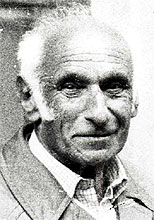
Alec Nove
When Alec Nove published a classic article on feasible socialism in New Left Review in early 1980 I was ready for it. Nove also argued that markets were essential to any viable socialism. He realised that he was attacking deeply-ingrained orthodoxy on the left.
(Later I had the pleasure of meeting both Kornai and Nove several times. Nove died in 1994 but Kornai is still alive. I am delighted to be invited as a keynote speaker at a conference in his honour in Budapest in 2018.)
Labouring as a revisionist
Any acceptance of markets was an anathema to followers of both Karl Marx and Tony Benn. Benn distanced himself from those who supported the persistence of markets.
But I found common ground with Benn and others over what was called “the alternative economic strategy”. I outlined my positive views on this in a pamphlet entitled Socialist Economic Strategy in 1979. It was published by Independent Labour Publications.
Independent Labour Publications was the residue of the old Independent Labour Party, which had played a central role in Labour history from the 1890s to the 1940s. The Independent Labour Party split from the Labour Party in 1931. But in 1975 it formally dissolved as a party and rejoined Labour as Independent Labour Publications.
I was involved in this organisation briefly. Despite outward appearances they turned out to be another sect, lacking any vision of a workable socialism. They too were uneasy about my revisionism. Although my Socialist Economic Strategy was a bestseller by their standards, they refused to reprint it. We parted company in 1981.

Geoff Hodgson, Jean Shepherd & John Maguire in 1979
In 1979 I was the unsuccessful Labour Parliamentary Candidate for Manchester Withington. The seat became Labour in 1987.
I met Benn a few times and supported him in the 1981 deputy leadership election. This alignment was marked in my book Labour at the Crossroads, published in that year. Therein I again supported the alternative economic strategy. But against Benn himself, I argued in that book that in some sectors of the economy “there is no substitute for competition and a market” (p. 206).
(In his important book on The Labour Party’s Political Thought, Geoffrey Foote quotes me (pp. 320, 347) as a “Bennite”. But because of my explicit acceptance of markets, I was unrepresentative of the Bennite stream of thought.)
Subsequently my opinion of Benn shifted. He was a magnificent speaker, but his writings on socialism are vague and unclear. His use of history is unscholarly and cavalier. He was not a well-read intellectual like Michael Foot.

Tony Benn at a Militant meeting
While Benn’s “alternative economic strategy” accepted markets and a private sector for the present, it seemed to me that he wanted to move eventually toward a socialist economy without any markets at all. It was no accident that Benn and his followers defended the Trotskyist sect Militant when they were pushed out of the party from 1985 to 1992.
In 1984 I published my book on The Democratic Economy, where I set out my view on the importance and complementarity of both markets and planning. My argument was framed in socialist language but therein I distanced myself from Marxism. The book received a critical response from many on both the soft and hard left.
The Labour Coordinating Committee
Margaret Thatcher came to power in 1979. One of Thatcher’s most popular policies was to promote the sale of council-owned housing to the tenants. Labour had opposed this policy. The disastrous 1983 defeat of Labour on a Bennite manifesto prompted a rethink, on this and several other issues.
For some of us, this rethink amounted to more than expedient doctrinal trimming. Encouraging home ownership was really a good idea: why should all property be owned by the rich? But while supporting home ownership, we argued that the government should also build more social housing and enlarge the stock available for rent by low-income families.
But these ideas met stiff resistance in the Labour Party ranks, and not simply from Trotskyist entryists such as Militant. The resistance from Benn and his supporters was substantial and even more enduring. It was clear that old-fashioned socialist ideas still had a tenacious appeal among Labour’s membership.
The Labour Coordinating Committee (LCC) became one of the primary modernising forces within Labour. Its leadership included Hilary Benn, Cherie Blair, Mike Gapes, Peter Hain, Harriet Harman, Kate Hoey (the Brexiteer) and others of enduring fame. I was elected to the LCC executive committee. We worked closely with the new leader Neil Kinnock, and with members of his shadow cabinet, including Robin Cook.
Changing Clause Four
I have detailed elsewhere my LCC attempt to bring about discussion to change Labour’s Clause Four. The version that had been in place since 1918 called for the “common ownership of the means of production, distribution and exchange”. This provided for no exception: all production would be in common ownership and there would be no private sector.
Although some Labour Party thinkers began to entertain the possibility of some private enterprise, many party members remained resolutely in support of widespread common ownership.
Against my efforts, the 1983 AGM of the Labour Coordinating Committee defeated the proposal that Clause Four should be rewritten. This was out of fear of antagonising the Benn wing. Instead, the LCC resolved that Clause Four should be “clarified”.
But a resolution on long-term aims, which I had helped to draft, was passed by a large majority. The resolution called for the Labour Party to draft a new statement of aims, upholding “that socialism involves extended democracy and real equality. Democracy under socialism is extended to industry and the community … and must involve a substantial decentralisation of power.”
There was a commitment to “political pluralism” and to “economic pluralism” involving “a variety of forms of common ownership … and the toleration of a small private sector including self-employed workers and other private firms.” The economy must be dominated by mechanisms of “democratic planning … but also accommodating a market mechanism in some areas.”
But there was strong hostility to these mildly revisionist ideas from within Labour’s ranks at the time, including from Jeremy Corbyn and Tony Benn.
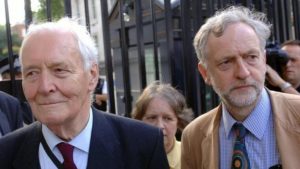
Tony Benn & Jeremy Corbyn
The Guardian newspaper reported the LCC conference with the headline: “Labour breaks taboo on ownership”. For a while, the LCC tried to keep the conversation going on the need to revise Labour’s aims. The LCC held a conference in Liverpool in June 1984 on “The Socialist Vision”. But enthusiasm for this discussion fizzled out. By 1985 the LCC’s revisionist initiative had been kicked into the long grass. My efforts had failed.
But to their credit, Neil Kinnock and his deputy Roy Hattersley saw the need for Labour to modernise its aims. I advised them both for a while. But after 1987 I became less active in the Labour Party. My inactivity was born partly out of frustration that it was so difficult to shift Labour from its congenital hostility to markets and private enterprise.
But after a fourth election defeat in 1992 the party became more pliable. Tony Blair was elected as leader in 1994. Blair successfully changed the wording of Clause Four to endorse a strong private sector, but the dramatic rise of Corbyn in the party since 2015 shows that the old collectivist DNA has endured.
Towards liberalism
In many ways I have always been a liberal, especially in my support for freedom of expression, other human rights and democracy. By the late 1970s I also accepted the importance of markets and private property. But the emphasis in my thinking has shifted further in the last 30 years.
My academic works show a few markers of my political evolution. On page xvi of my 1999 book Economics and Utopia I wrote of my common ground with the US liberal John Dewey and with
“British social liberalism, which stretches from John Stuart Mill through Thomas H. Green to John A. Hobson, John Maynard Keynes and William Beveridge.”
These thinkers still inspire me. But I would now also stress the importance of Thomas Paine. Other heroes include George Orwell and Arthur Koestler.
So by 1999 I was a true liberal, of social-democratic stripe. I had already moved some distance from the ideas in my 1984 book, which had over-stressed the possibilities for large-scale planning and for extensive democratic decision-making in large, complex economies.
But I still believe in judicious state intervention and regulation, and I am still an enthusiast for experiments with worker cooperatives and other forms of worker and community participation. With their lower levels of economic inequality, I see the Nordic countries as good role models for in the rest of the capitalist world.
From leaving Labour to joining the Liberal Democrats
In 2001 I left the Labour Party because of Blair’s energetic support for faith schools, Labour’s inadequate proposal for House of Lords reform and its neglect of the problem of economic inequality. I would have left over the Iraq War. Previously I had sometimes voted tactically for the Liberal Party, when they were second behind the Tories in my constituency. But what was tactical was also in growing part a matter of conviction.
I voted Liberal Democrat in the 1997, 2001, 2005 and 2010 general elections. But I did not approve of the coalition with the Tories. So the Liberal Democrats did not get my vote in 2015.
I re-entered political activity in 2016 after the Brexit referendum. My wife (Vinny Logan) had been a critical but close companion on my long journey since 1980. But unlike me she had always voted Labour. After the Brexit vote she joined the Liberal Democrats and I followed her after a few days. It will be a long hard slog to change British politics for the better, but it is vital that we try.
My wife and I were each brought up in a social culture where the Tories and the Establishment were the enemy, and the Liberals were seen as wishy-washy waverers in the class war. Labour was the only game in town.
It takes a long time to remove these ingrained preconceptions and learn that liberalism is the greatest legacy of the Enlightenment. It is the strongest guardian of both prosperity and freedom. Although Liberals have been in a minority, they are largely responsible for the foundation of the British welfare state. The NHS was originally a Liberal proposal. The Liberal Democrats constitute the most pro-EU party in the UK.
But some Liberal Democrats do not understand that it is the job of government in a recession to increase effective demand, particularly by increasing investment and raising disposable incomes for the poor. But the party is a broad church, and I will argue my corner in favour of Keynesian liberal economic policies.
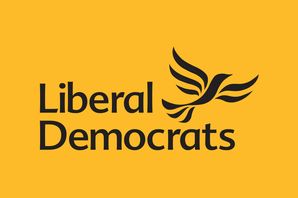 I am a radical liberal. I believe in social solidarity with the less-privileged, as well as in individual rights. As Charles Kennedy showed when he was leader, the Liberal Democrats can succeed when they take principled, radical positions on justice, equality and war.
I am a radical liberal. I believe in social solidarity with the less-privileged, as well as in individual rights. As Charles Kennedy showed when he was leader, the Liberal Democrats can succeed when they take principled, radical positions on justice, equality and war.
Today, both the Conservatives (now ruled by deceitful nationalists) and Labour (where the rising hard left dominate the timid moderates) are dangerous threats to the liberal and democratic rights and values that in the past we have taken too much for granted. We must now stand up to defend those rights and values, against dogma, ignorance, intolerance, petty nationalism and deceit.
20 September 2017
Minor edits – 25 September 2017, 22 October 2017, 10 April 2018.
This book elaborates on some of the political issues raised in this blog:
Published by University of Chicago Press in January 2018 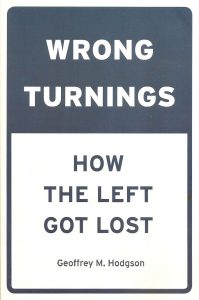
Bibliography
Foote, Geoffrey (1997) The Labour Party’s Political Thought: A History, 3rd edn. (London: Palgrave).
Hodgson, Geoffrey M. (1975) Trotsky and Fatalistic Marxism (Nottingham: Spokesman).
Hodgson, Geoffrey M. (1977) Socialism and Parliamentary Democracy (Nottingham: Spokesman).
Hodgson, Geoffrey M. (1979) Socialist Economic Strategy (Leeds: Independent Labour Publications).
Hodgson, Geoffrey M. (1981) Labour at the Crossroads: The Political and Economic Challenge to Labour Party in the 1980s (Oxford: Martin Robertson).
Hodgson, Geoffrey M. (1984) The Democratic Economy: A New Look at Planning, Markets and Power (Harmondsworth: Penguin).
Hodgson, Geoffrey M. (1999) Economics and Utopia: Why the Learning Economy is not the End of History (London and New York: Routledge).
Hodgson, Geoffrey M. (2017) Wrong Turnings: How the Left Got Lost (Chicago: University of Chicago Press, forthcoming).
Kornai, János (1965) ‘Mathematical Programming as a Tool of Socialist Economic Planning’, reprinted in Nove, Alec and Nuti, D. M. (eds) (1972) Socialist Economics (Harmondsworth: Penguin), pp. 475-488.
Nove, Alec (1980) ‘The Soviet Economy: Problems and Prospects’, New Left Review, no. 119, January-February, pp. 3-19.
Nove, Alec (1983) The Economics of Feasible Socialism (London: George Allen and Unwin).
Nove, Alec and Nuti, D. M. (eds) (1972) Socialist Economics (Harmondsworth: Penguin).
Posted in Bertrand Russell, Common ownership, Democracy, Jeremy Corbyn, Karl Marx, Khmer Rouge, Labour Party, Left politics, Liberalism, Ludwig von Mises, Mao Zedong, Markets, Nationalization, Private enterprise, Property, Right politics, Socialism, Soviet Union, Tony Benn
September 2nd, 2017 by geoffhodgson1946
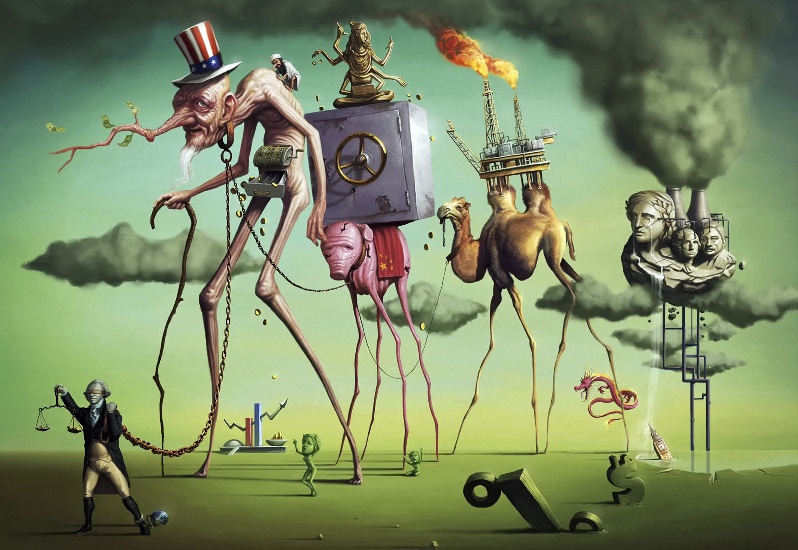
Geoffrey M. Hodgson
In terms of basic assumptions, Marxism has more in common with some prominent versions of so-called “neoliberalism” than is generally understood. Obviously, Marxism is opposed to a market economy. But some core ideas by Karl Marx and Frederick Engels are remarkably similar to those of some so-called “neoliberals”. For example, Marx’s definition of property resembles that of Ludwig von Mises.
But the parallels go much further, and are disturbing in their consequences. They concern the independence of the legal system and the nature and legitimation of democracy. They also concern the viability of civil society and the autonomy of personal and social life.
The argument here shows that liberalism – both historically and currently – is very different from some modern versions of “neoliberalism”. This “neoliberalism” is theoretically closer to Karl Marx than to Thomas Paine or John Stuart Mill.
Marxism undermines the autonomy of politics and civil society
The Marxian analysis of capitalism treats law and the state as an expression of class interests, which in turn are grounded on “economic relations”. Hence, for Marx, law and the state “originate in the material conditions of life“. They are part of the “superstructure” built upon the “economic base”.
The Marxist analytical reduction of everything to economics does not stop there. Consider the notion of civil society.
Civil society generally connotes a realm of free, partly self-organising, property-owning citizens, who interact under the rule of the state and its laws. In most accounts it includes private business and markets, but it is not reducible to them. It also embraces many forms of social association (including recreation, religion and philanthropy) that are not driven by business interests.
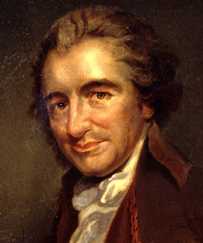
Thomas Paine
Distinctions between civil society and the state, and between civil society and the narrower world of trade and business, were developed by Enlightenment liberal writers such as Adam Smith, Adam Ferguson, Thomas Paine, Alexis de Tocqueville and others. They are crucial for modern liberal theory.
In its analysis of capitalism, Marxism made the state, law, politics and civil society all analytically subservient to markets and business.
These may be regarded as extreme formulations within Marxism. Certainly there are more sophisticated treatments by Marxists of civil society and the state, not least by Antonio Gramsci. But Marxism is severely impaired by the words of its founders.
The above extracts concern the Marxian analysis of capitalism, not its vision of an ideal society, which of course is strikingly different from that of (neo)liberals. While the Marxian analysis of capitalism undermines the conceptual distinction between civil society and the state – by making them both subservient to economic relations – Marxian politics also dissolves it in practice.
In his early tract On the Jewish Question, Marx argued that civil society and political society should become one and the same. In practice, under socialism, once much of the economy becomes a state bureaucracy. With private association under restriction, the scope of civil society is much diminished.
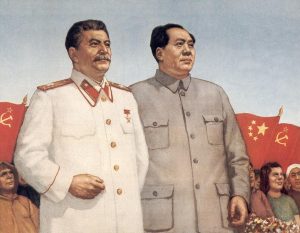 The conceptual and practical degradation of civil society is but one of the roots of totalitarianism within Marxism. Other sources are discussed elsewhere. The smothering of civil society within the party-state makes opposition more difficult and paves the way to dictatorship – a process witnessed in all Marxist regimes, from Russia to Venezuela.
The conceptual and practical degradation of civil society is but one of the roots of totalitarianism within Marxism. Other sources are discussed elsewhere. The smothering of civil society within the party-state makes opposition more difficult and paves the way to dictatorship – a process witnessed in all Marxist regimes, from Russia to Venezuela.
The reclamation of civil society by Eastern European dissidents
Long before the fall of the Berlin Wall in 1989, underground opposition groups had developed in several Soviet Bloc countries. After the crushing of the Hungarian Uprising in 1956, and after the Soviet invasion of Czechoslovakia in 1968, opposition to the Marxist party-state became most developed in Poland.

Leszek Kolakowski
In 1971 the Polish intellectual Leszek Kołakowski wrote his Theses on Hope and Despair. These were circulated illegally in his home country.
Kołakowski complained that the Soviet-style regime had “monopolistic power” that impelled “the atomization of society and the destruction of all forms of social life not prescribed by the ruling apparat.” He called for a pluralist society with genuine freedom of information, discussion and association.
 Subsequently, other Eastern European intellectuals such as Jacques Rupnik called for “the rebirth of civil society”. After the formation of the mass trade union movement Solidarity in Poland in 1980, still more voices were added. The Hungarian Andrew Arato wrote in 1981 of the new dissident wave:
Subsequently, other Eastern European intellectuals such as Jacques Rupnik called for “the rebirth of civil society”. After the formation of the mass trade union movement Solidarity in Poland in 1980, still more voices were added. The Hungarian Andrew Arato wrote in 1981 of the new dissident wave:
“one point unites them all: the viewpoint of civil society against the state – the desire to institutionalize and preserve the new level of social independence.”
Before its unexpected elevation to political power in 1989, Solidarity saw itself as essentially a movement for the “self-defence” of civil society against totalitarian power.
But while the dissidents drew on Enlightenment and liberal thought, their political philosophy was often underdeveloped. After 1989, many former dissidents became influenced by extreme forms of market libertarianism. But given the parallels – explored below – between this “neoliberalism” and Marxist thought, there was more continuity in their thinking than immediately meets the eye.
Market universalism
To understand the connection between “neoliberalism” and Marxism we need first to address a much broader phenomenon within social science.
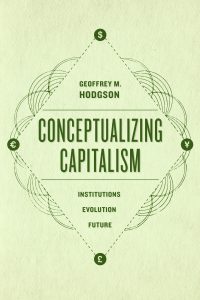 There is a widespread tendency to use the language of trade and markets to describe phenomena that are neither traded nor markets. I gave some examples in my Conceptualizing Capitalism book. I here call it market universalism.
There is a widespread tendency to use the language of trade and markets to describe phenomena that are neither traded nor markets. I gave some examples in my Conceptualizing Capitalism book. I here call it market universalism.
Consider the notion of a “market for ideas”, which can be found in the writings of Nobel Laureate Ronald Coase. He did not refer to intellectual property but to conversation and freedom of expression.
Douglass North, another Nobel Laureate, wrote of “political markets”. He was not referring to vote-buying (in countries like India) or political bribery, but to the general process of multi-party competition in a democracy.
In a paper published in 1988, Bruce Benson and Eric Engen envisioned “the legislative process as a market for laws” where interest groups “pay” legislators for laws as “products”.
By minimal criteria, none of these is a market. Rules concerning contracts, enforcement and property rights are lacking.
For example, the ordinary communication or debating of ideas does not involve enforceable contracts. Generally, conversation is not an intentional transfer of property rights.
Similarly, if we vote for a politician or a party that does not typically amount to an enforceable agreement. Competition between politicians or parties for votes or power is not a contest for contracts under any established system of contractual rules.
Likewise, with the supposed “market for laws”, in reality there are rarely any enforceable contracts between interest groups and legislators.
There is a further problem. What would be the system of rules under which these supposed “contracts” between legislators and interest groups are formed and enforced? Hence a “market for laws” would require supra-legal institutions with their own (legal or other) rules. We would need markets for markets-for-laws, or markets for meta-rules.
This reveals a problem of an infinite regress, showing that not everything can be placed on a market. My Conceptualizing Capitalism book gives further reasons why markets cannot be universal. There will always be missing markets.
Market universalism and “neoliberalism”
Although market universalism may be dismissed as the harmless use of metaphor, it contains dangerous policy temptations.
Making everything a market denies the autonomy of law and politics: everything is subsumed within the market zone. All forms of association are regarded as market-like or contractual arrangements. Legal and political relations or rights are reduced to the “economic” facts of possession or control.
The temptation is to downgrade all non-commercial justifications for democracy, law or social life. Everything is forced into the conceptual straitjacket of property and contract, and evaluated in terms of profit and loss.
Previous liberal thinkers had defended rights to private property, other human rights, plus institutions such as democracy. By contrast, market universalism can highlight control over property first, on the grounds that it is the foundation of all other rights and liberties. Property moves from being a necessary but insufficient condition of liberty, to being necessary and sufficient for the same.
 This transforms the Enlightenment argument that the government must be legitimated by representative democracy, rather than by tradition or divine rule. The “political market” makes democracy a market, and market-like criteria become the overriding source of legitimation for everything.
This transforms the Enlightenment argument that the government must be legitimated by representative democracy, rather than by tradition or divine rule. The “political market” makes democracy a market, and market-like criteria become the overriding source of legitimation for everything.
Furthermore, democracy may be seen as secondary or expedient, especially when property or markets are perceived as being under threat. By treating democracy as another market, a temptation is to regard markets and property as generally more important or supreme than democracy.
Consequentially, market universalism enables something very different from other forms of liberalism, and it involves a radically modified conceptual foundation. One may be tempted to call it neoliberalism.
This is the label suggested by Philip Mirowski, who addressed what he called the Mont Pèlerin “thought collective”. In a perceptive essay on this influential intellectual movement, which involved Friedrich Hayek, Milton Friedman, Ludwig von Mises and others, Mirowski identified several of its traits including the following:
“Skepticism about the lack of control of democracy is offset by the persistent need to provide a more reliable source of popular legitimacy for the neoliberal market state. Neoliberals seek to transcend the intolerable contradiction by treating politics as if it were a market and promoting an economic theory of democracy.”
Foundations of anti-democratic authoritarianism
We can now see what Marxists and market universalists have in common. They all look upon capitalism as system where everything is reducible to a market.
For Marxists, this means that civil society is nothing more than the sphere of business and individual greed. In addition, the political and legal spheres are simply reflections of these business interests.
A policy consequence – after the socialist revolution – is to destroy civil society and absorb it into politics and the state. This forms part of the Marxist foundation for totalitarianism.
Of course, for “neoliberals”, markets are always beneficial. But the problem is much more serious than their ever-familiar agoraphilia.
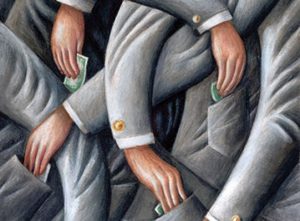 Through notions such as “political markets” and “markets for laws”, market universalist “neoliberals” reduce the state and its legal system to a grand marketplace. The state and law become additional markets alongside others. The policy temptation is the practical marketization of the state and the doctrinal denial of the autonomy of politics.
Through notions such as “political markets” and “markets for laws”, market universalist “neoliberals” reduce the state and its legal system to a grand marketplace. The state and law become additional markets alongside others. The policy temptation is the practical marketization of the state and the doctrinal denial of the autonomy of politics.
Once politics and all civil society are seen through the lenses of trade and markets, then the basic elements of property and contract become supreme. Instead of being a necessary but insufficient precondition of liberty, property becomes both necessary and sufficient.
This transforms the Enlightenment argument that the government must be legitimated by representative democracy, rather than by divine rule. The “political market” makes democracy a market, and this becomes the overriding source of legitimation.
Consequently, democracy becomes secondary or expedient, especially when property or markets are perceived as being under threat. By treating democracy as another market, a temptation is to regard markets and property as generally more important or supreme than democracy.
Leading “neoliberals” like von Mises and Hayek have been described as classical liberals. But their views are a departure in important respects from the Enlightenment liberalism of the eighteenth and nineteenth centuries, and from other more recent currents of liberal thinking. In some important respect they are closer to Karl Marx than John Stuart Mill.
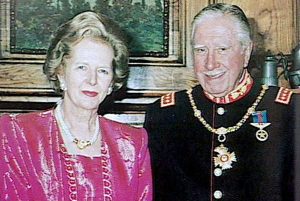
Margaret Thatcher and Augusto Pinochet
Their supreme emphasis on property rights explains why some “neoliberals” have dallied with dictators. For example, in a book originally published in 1927, von Mises praised fascism as “an emergency makeshift” that “has, for the moment, saved European civilization”. Hayek was notoriously silent about the human rights violations in Chile under the dictator Pinochet. These fascist or dictatorial regimes were seen by them as saviours of private property.
Conclusion: liberalism is not “neoliberalism”
Despite their opposed policy stances, Marxism and the type of market-universalist “neoliberalism” discussed here have similarities at their theoretical foundations. While Marxism reduces the analysis of civil society and politics to an economistic world dominated by self-seeking egoists, this “neoliberalism” does exactly the same.
Within this version of “neoliberalism”, everything is legitimated by free contract in unfettered markets in all spheres of human interaction, including within the state itself. Like Marxism, it reduces everything to economics.
This entails a radical break from other forms of liberalism, and from all other doctrines that recognise the relative autonomy of the political and legal spheres from the economy and from civil society.
2 September 2017
Minor edits – 8, 10 September 2017
This book elaborates on some of the political issues raised in this blog:

Published by University of Chicago Press in January 2018
References
Arato, Andrew and Cohen, Jean (1992) Civil Society and Democratic Theory (Cambridge, MA: MIT Press).
Benson, Bruce L. and Engen, Eric M. (1988) ‘The Market for Laws: An Economic Analysis of Legislation’, Southern Economic Journal, 54(3), January, pp. 732-745.
Caldwell, Bruce J. and Montes, Leonidas (2015) ‘Friedrich Hayek and his Visits to Chile’, Review of Austrian Economics, 28(3), pp. 261-309.
Cohen, Jean (1982) Class and Civil Society: The Limits of Marxian Critical Theory (Oxford, Martin Robertson).
Hodgson, Geoffrey M. (2015) Conceptualizing Capitalism: Institutions, Evolution, Future (Chicago: University of Chicago Press).
Hodgson, Geoffrey M. (2017) Wrong Turnings: How the Left Got Lost (Chicago: University of Chicago Press, forthcoming).
Keane, John (ed.) (1988) Civil Society and the State (London: Verso).
Keane, John (1995) Tom Paine: A Political Life (London: Bloomsbury).
Keane, John (1998) Civil Society: Old Images, New Visions (Cambridge: Polity).
Kumar, Krishan (1993) ‘Civil Society: An Inquiry into the Usefulness of an Historical Term’, British Journal of Sociology, 44(3), September, pp. 375-395.
Mirowski, Philip and Plehwe, Dieter (eds) (2015) The Road from Mont Pèlerin: The Making of the Neoliberal Thought Collective, paperback edition (Cambridge MA: Harvard University Press). (Quote from p. xvii.)
Mises, Ludwig von (1985) Liberalism in the Classic Tradition. Translated from the German edition of 1927 (Irvington, NY: Foundation for Economic Education).
Polan, Anthony J. (1984) Lenin and the End of Politics (London: Methuen).
Venugopal, Rajesh (2015) ‘Neoliberalism as a Concept’, Economy and Society, 44(2), pp. 165-87. http://www.tandfonline.com/doi/abs/10.1080/03085147.2015.1013356.
Posted in Common ownership, Democracy, Karl Marx, Left politics, Leszek Kolakowski, Liberalism, Ludwig von Mises, Markets, Neoliberalism, Politics, Private enterprise, Property, Right politics, Socialism, Soviet Union, Venezuela
May 21st, 2017 by geoffhodgson1946
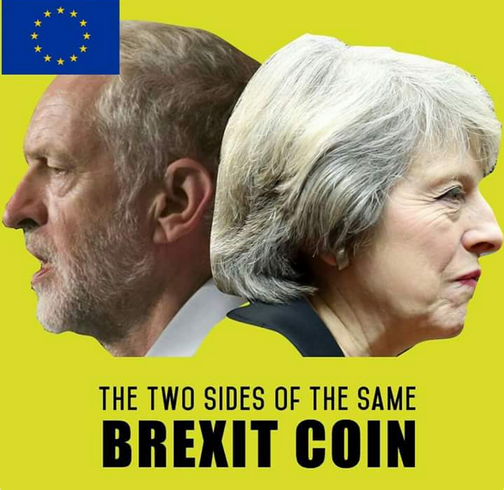
Geoffrey M. Hodgson
Although the two biggest UK political parties are very different in important respects, Labour under Jeremy Corbyn and the Conservatives under Theresa May have each converged on different forms of pro-Brexit, economic nationalism.
Economic nationalism prioritises national and statist solutions to economic problems. Although it does not shun them completely, it places less stress on global markets, international cooperation and the international mobility of capital or labour. It believes that the solutions to major economic, political and social problems lie within the competence of the national state.
 Other countries have turned in the same direction, including the United States under Donald Trump and Russia under Vladimir Putin. Previously, both Soviet-style and fascist economies have embraced economic nationalism. China has continued along this road, even after its acceptance of private enterprise and a market economy.
Other countries have turned in the same direction, including the United States under Donald Trump and Russia under Vladimir Putin. Previously, both Soviet-style and fascist economies have embraced economic nationalism. China has continued along this road, even after its acceptance of private enterprise and a market economy.
Economic nationalism has been used successfully as a tool of economic development, by creating a state apparatus to build an institutional infrastructure and mobilise resources. But it brings severe dangers as well as some advantages. Its reliance on nationalist rhetoric can feed intolerance, racism and extremism.
Furthermore, as it concentrates economic and political power in the hands of the state, economic nationalism undermines vital checks and balances in the politico-economic architecture.
As numerous social scientists (from Barrington Moore to Douglass North) have shown, democracy and human rights cannot be safeguarded without a separation of powers, backed by powerful countervailing politico-economic forces that keep the state in check.
From Thatcherism to Mayhem: Tory economic nationalism
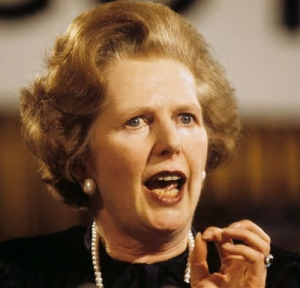
Margaret Thatcher
In the 1970s, Margaret Thatcher changed the Tory party from a paternalist party of the elite to a more radical, free-market and individualist force, embracing the ideologies of Friedrich Hayek and Milton Friedman.
A logical consequence of this market fundamentalism was to embrace the European Single Market, which her successor John Major did in the Maastricht Treaty of 1992. But this was too much for the Tory nationalists, who were already turning against the European Union and all its works.
The tension grew within the Tories between those that pursued international markets in the name of market fundamentalism, and those who worried that global trade and the free movement of labour were undermining the powers of the British nation state.
A compromise option – widely touted during the June 2016 EU referendum – was to exit the EU but remain in the single market. But a major implication of this was that the free movement of labour to and from the EU would have to be retained. May became prime minister and declared that Britain would leave the single market as well as the EU.
This marks a major ideological shift within the Conservative Party. The pursuit of free markets, promoted so zealously by Thatcher, has moved down the Tory agenda, in favour of nationalism, increased state control, reduced parliamentary scrutiny, and lower immigration, whatever the economic costs.
Forward together: the new-old Toryism
This shift is signalled by a remarkable passage in the 2017 Conservative general election manifesto:
“We do not believe in untrammelled free markets. We reject the cult of selfish individualism.”
This could be interpreted as a cynical attempt to attract some Labour voters. Probably, in part, it is. But there is much more to it than that. It shows how all the whingeing about “neoliberalism” is now outdated and much off the mark.
Crucially, the Tory Party was traditionally opposed to “untrammelled free markets” and it worried about the destructive and corrosive effects of individualism and greed.
As Karl Polanyi pointed out in his classic book on The Great Transformation, the first fighters for factory and employment legislation, to protect workers from the results of reckless industrialization in the 1830s and 1840s, were from the ranks of the church and the Tory Party:
“The Ten Hours Bill of 1847, which Karl Marx hailed as the first victory of socialism, was the work of enlightened reactionaries.”1
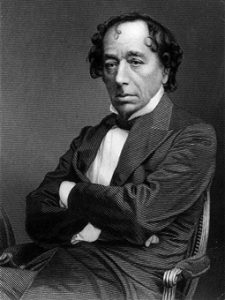
Benjamin Disraeli
Tories like Anthony Ashley-Cooper, the Seventh Earl of Shaftesbury, were great nineteenth-century social reformers. The Tory Prime Minister Benjamin Disraeli railed against selfish individualism, particularly in his novels. For Disraeli, British imperialism was more important than unalloyed individualism.
May has brought the Tory party back to its pre-Thatcher roots. But, less enlightened than Shaftesbury or Disraeli, she has little appetite for protective legislation or constitutional reform. Instead, she celebrates her own powers of leadership and seeks a mandate to concentrate power in her hands.
She has little enthusiasm for democracy either. If it were not for the heroic efforts of Gina Miller and the decision of the Supreme Court, the triggering of Article 50 – to start the process of leaving the European Union – would have been taken by the executive without a parliamentary vote.
The 2017 Tory manifesto is a maypole for nationalism. “Britain” is one of its most-used words. It says that immigration will be brought down, while existing powers by the British state to read emails and monitor your activity on the web will be increased. She will create an Internet that is controlled by the state. May is developing the infrastructure of an authoritarian nationalist regime.
Bringing the state back in: Labour’s new-old economic nationalism
At least on the surface, there are dramatic differences with Labour’s manifesto, which, for example, contains more measures targeted at the poor and elderly. Labour also gives much more verbal emphasis to human rights and democracy.
But at the core of Labour’s 2017 manifesto is a strong dose of economic nationalism, with Labour’s greatest commitment to public ownership since the “suicide note” manifesto of 1983. There are plans to bring the railways, energy, water and the Royal Mail all back into public ownership.
The 2017 manifesto declares: “Many basic goods and services have been taken out of democratic control through privatization.” But there is little explanation of what “democratic control” would mean under public ownership.
How would it work? Would parliament take decisions on everything? In reality these proposals – whatever their other merits – would enlarge state bureaucracy: there is no explanation how they would extend democracy.
The words “control” or “controls” appear 32 times in the 2017 manifesto. There is insignificant explanation of how “controls” work. The Labour manifesto envisions a concentration of economic power in the hands of the state, notwithstanding its verbal commitment to regional and local, as well as national, public management.
While there are commendable measures to enhance and enlarge an autonomous sector of worker-owned enterprises, there is little recognition of the importance of having a viable and dynamic private sector as well.
Corbyn’s Labour: forward to the past
As May has brought the Tories back to the pre-Thatcher years, Corbyn has brought Labour back to its traditional roots, before the leadership of Tony Blair.
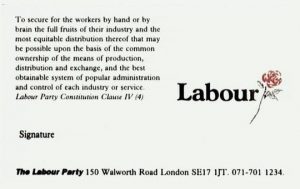 With his 1995 changes to Clause Four of the Labour Party Constitution, Blair brought in an explicit commitment to a dynamic private sector. Labour stood for an economy where “the enterprise of the market and the rigour of competition are joined with the forces of partnership and co-operation”. Corbyn has returned to the spirit of Labour pre-1995 constitution, even if he has not yet changed the wording.
With his 1995 changes to Clause Four of the Labour Party Constitution, Blair brought in an explicit commitment to a dynamic private sector. Labour stood for an economy where “the enterprise of the market and the rigour of competition are joined with the forces of partnership and co-operation”. Corbyn has returned to the spirit of Labour pre-1995 constitution, even if he has not yet changed the wording.
Corbyn has proposed that Britain can be “better off” outside the EU. He argued that EU rules block the kind of state-heavy industrial policy that he favours. But EU countries such as France and Germany already have strong interventionist policies for industrial and infrastructural development. In truth, Corbyn favours repeated doses of statist socialism in one country.
With some Stalinist exceptions in his coterie, Corbyn and his followers are mostly sincere in their commitment to democracy and human rights. But what they do not understand is that their proposed statist concentration of economic power will undermine countervailing politico-economic forces that can help to keep the state leviathan in check.
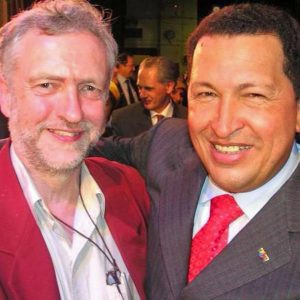
Jeremy Corbyn and Hugo Chávez
These countervailing and separated powers are vital. Especially in times of hardship or crisis, there will be a temptation by some in power (at the local or national level) to abuse rights and undermine democracy. Every single historical case shows this result.
Attempts “to take control of the economy”, even with measures of decentralization and local power, have led to restrictions on press freedom, arbitrary detentions, abuses of human rights, and even famine.
Forward together: economic nationalists take the helm
Further doses of economic nationalism may be possible in a country as large as the United States. In 2015, exports from the USA amount to about 13 per cent of GDP. Hence economic nationalists in the USA can reduce trade without too much contraction of the economy. It may turn further inwards, cut imports and still survive a loss of exports.
But the UK has become a globally-orientated, open economy, exporting 28 per cent of its GDP in 2015. About 45 per cent of these exports go to the European Union.
 By exiting the EU Single Market, and by walking away from EU trade deals with non-EU countries that benefit EU member states, Labour and the Tories would threaten the UK economy with a massive downturn. The British economy would fall off a cliff.
By exiting the EU Single Market, and by walking away from EU trade deals with non-EU countries that benefit EU member states, Labour and the Tories would threaten the UK economy with a massive downturn. The British economy would fall off a cliff.
In this crisis, rightist economic nationalists will blame foreigners and immigrants, and leftist economic nationalists will blame the rich.
It will be “the few” – designated by their ethnicity or by their assets – who will get the blame. Their rights will be under threat, as so will the liberties of all of us. Whatever variety is chosen, economic nationalism could severely undermine the viability of democracy in the UK.
21 May 2017
Minor edits – 23, 28 May, 29 June
|
This book elaborates on some of the political issues raised in this blog:
Wrong Turnings: How the Left Got Lost
Published by University of Chicago Press in January 2018
|
Endnote
Bibliography
Hodgson, Geoffrey M. (2017) Wrong Turnings: How the Left Got Lost (Chicago: University of Chicago Press, forthcoming).
Moore, Barrington, Jr (1966) Social Origins of Dictatorship and Democracy: Lord and Peasant in the Making of the Modern World (London: Allen Lane).
North, Douglass C., Wallis, John Joseph and Weingast, Barry R. (2009) Violence and Social Orders: A Conceptual Framework for Interpreting Recorded Human History (Cambridge and New York: Cambridge University Press).
Polanyi, Karl (1944) The Great Transformation: The Political and Economic Origins of Our Time (New York: Rinehart). See esp. pp. 165-66.
Posted in Brexit, Common ownership, Democracy, Donald Trump, Immigration, Jeremy Corbyn, Labour Party, Left politics, Liberalism, Markets, Nationalization, Politics, Populism, Private enterprise, Property, Right politics, Tony Blair, Tony Blair, Uncategorized, Venezuela
May 8th, 2017 by geoffhodgson1946
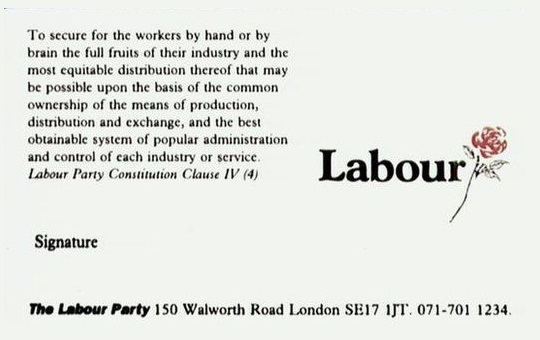
Geoffrey M. Hodgson
This is in part a personal memoir – concerning my role in a minor episode in political history. More importantly, it has lessons concerning Labour’s ideological inertia – the difficulty of modernising the party and bringing it from the nineteenth to the twenty-first century.
Socialism and Labour’s Clause Four
Both Robert Owen and Karl Marx defined socialism as “the abolition of private property”. This kind of collectivist thinking was encapsulated in Clause Four, Part Four of the Labour Party Constitution when it was adopted in 1918:
“To secure for the workers by hand or by brain the full fruits of their industry and the most equitable distribution thereof that may be possible upon the basis of the common ownership of the means of production, distribution and exchange, and the best obtainable system of popular administration and control of each industry or service.”
This provided for no exception: all production would be in common ownership and there would be no private sector. Although some Labour Party thinkers began to entertain the possibility of some private enterprise, many party members remained resolutely in support of widespread common ownership.
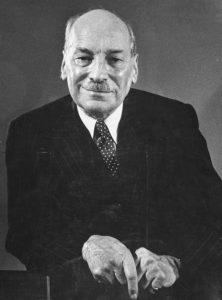
Clement Attlee
In 1937, eight years before he became Prime Minister, Clement Attlee approvingly quoted the words of Bertrand Russell: “Socialism means the common ownership of land and capital together with a democratic form of government. … It involves the abolition of all unearned wealth and of all private control over the means of livelihood of the workers.”
After 1945, the position of many leading Labour Party members began to shift. First the realities of gaining and holding on to power – as a majority party for the first time – dramatized the political and practical unfeasibility of abolishing all private enterprise. Some nationalization was achieved, but a large private sector remained.
In 1956 C. Anthony Crosland published The Future of Socialism. This sought a reconciliation with markets, private enterprise and a mixed economy. In 1959 the (West) German Social Democratic Party abandoned the goal of widespread common ownership. In the same year, Hugh Gaitskell tried to get the British Labour Party to follow this lead, but met stiff resistance. Clause Four remained intact.
Richard Toye noted that the Labour Party assumed widespread public ownership and failed to develop adequate policies concerning the private sector:
“Labour, until at least the 1950s, showed little interest in developing policies for the private sector. During the 1960s, the party demonstrated continuing ambiguity about whether or not competition was a good thing. This ambiguity continued at least until the 1980s.”
The Thatcher Revolution
There were Labour governments from 1964 to 1970 and from 1974 to 1979. But then Margaret Thatcher came to power.
After this defeat, Labour’s instinct was to turn to the left, in the belief that it could have held onto power if it had held to classical socialist principles. Michael Foot was elected as leader, and Dennis Healey narrowly defeated Tony Benn for the position of deputy leader.
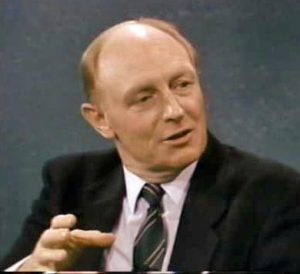
Neil Kinnock
Despite a severe recession with millions unemployed, following the implementation of monetarist austerity policies, Labour suffered a massive defeat in the 1983 general election. Labour’s share of the vote fell below 28 per cent – the party’s lowest figure since 1918. Michael Foot resigned as leader and Neil Kinnock took his place.
Thatcher had boosted her popularity due the Falklands War. One of Thatcher’s most popular domestic policies was to promote the sale of council-owned housing to the tenants. Labour had opposed this policy. The 1983 defeat prompted a rethink, on this and other issues.
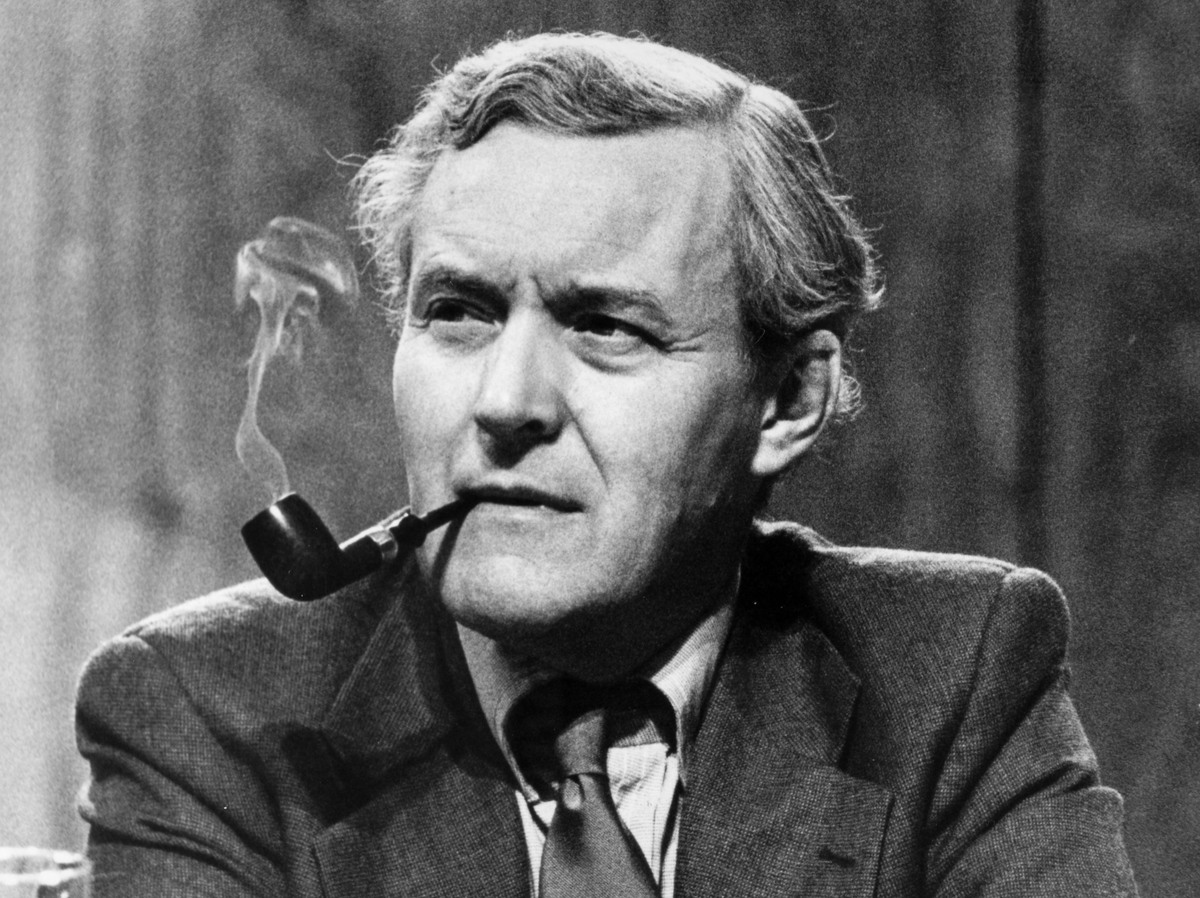
Tony Benn
For some of us, this rethink amounted to more than expedient doctrinal trimming. Encouraging home ownership was really a good idea: why should all property be owned by the rich? But while supporting home ownership, we argued that the government should also build more social housing and enlarge the stock available for rent by low-income families.
But these ideas met stiff resistance in the Labour Party ranks, and not simply from Trotskyist entryists such as Militant. The resistance from Tony Benn and his supporters was substantial and even more enduring. It was clear that old-fashioned socialist ideas still had a tenacious appeal for Labour’s membership.
The Labour Coordinating Committee
The Labour Coordinating Committee (LCC) became one of the primary modernising forces within Labour. Its leadership included Hilary Benn, Cherie Blair, Mike Gapes, Peter Hain, Harriet Harman and others of enduring fame. I was elected to its executive committee. We worked closely with Kinnock and members of his shadow cabinet, including Robin Cook.
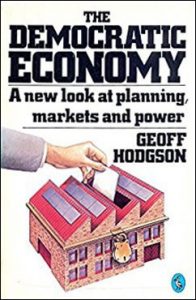 I had written a book entitled The Democratic Economy where I argued that socialists should support a permanent private sector in the economy. The book was published by Penguin in 1984. Another influential work at the time was Alec Nove’s Economics of Feasible Socialism, which also argued for a substantial role for markets.
I had written a book entitled The Democratic Economy where I argued that socialists should support a permanent private sector in the economy. The book was published by Penguin in 1984. Another influential work at the time was Alec Nove’s Economics of Feasible Socialism, which also argued for a substantial role for markets.
On 26 November 1983, at the Labour Coordinating Committee AGM in Birmingham, I proposed that Clause Four of the Labour Party constitution should be rewritten to include an acceptance of a private sector and a role for markets. But I was defeated over the idea that Clause Four should be rewritten. This was out of fear of antagonising the Benn wing. Instead, the LCC resolved that Clause Four should be “clarified”.
But a resolution on long-term aims, which I had helped to draft, was passed by a large majority. The resolution called for the Labour Party to draft a new statement of aims, upholding “that socialism involves extended democracy and real equality. Democracy under socialism is extended to industry and the community … and must involve a substantial decentralisation of power.”
Equality meant the “absence of discrimination on the basis of gender and race, universal freedom from poverty, and a widespread distribution of wealth and power, as well as formal equality under the law and universal suffrage.”
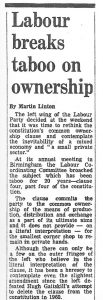 There was a commitment to “political pluralism” and to “economic pluralism” involving “a variety of forms of common ownership … and the toleration of a small private sector including self-employed workers and other private firms.” The economy must be dominated by mechanisms of “democratic planning … but also accommodating a market mechanism in some areas.”
There was a commitment to “political pluralism” and to “economic pluralism” involving “a variety of forms of common ownership … and the toleration of a small private sector including self-employed workers and other private firms.” The economy must be dominated by mechanisms of “democratic planning … but also accommodating a market mechanism in some areas.”
There was also a “commitment to internationalism, disarmament and peace” and “a disengagement from the power blocs” of the West and East.
I think that today Jeremy Corbyn and his followers would accept much or all of this, at least as a temporary stopping-point on the road to full socialism. But in the 1980s there was strong hostility to these revisionist ideas from within Labour’s ranks at the time, including from Corbyn and Tony Benn.
Since then my own views have adjusted. See my Wrong Turnings book. But this blog is not primarily about me. It is about what has happened to the Labour Party and how difficult it is to change its DNA.
For a while, the LCC tried to keep the conversation going on the need to revise Labour’s aims. The Guardian newspaper reported the LCC conference with the headline: “Labour breaks taboo on ownership”.
The LCC held a conference in Liverpool in June 1984 on “The Socialist Vision”. But enthusiasm for this discussion fizzled out. Many leaders of the LCC wanted a political career, and they wished to widen their support on constituency selection committees.
By 1985 the LCC’s revisionist initiative had been kicked into the long grass. My efforts to change Clause Four had failed.
From Kinnock to Blair
But to their credit, Neil Kinnock and his deputy Roy Hattersley saw the need for Labour to modernise its aims. I advised them both for a while. Another election defeat in 1987 spurred a rethink. But by then I had become inactive in the Labour Party.
As Richard Toye has recorded, in 1988 Kinnock and Hattersley presented a new document on “Aims and Values” to Labour’s National Executive Committee. But “it was criticised by John Smith, Bryan Gould and Robin Cook as being too enthusiastic about the benefits of the market, and was watered down accordingly”.
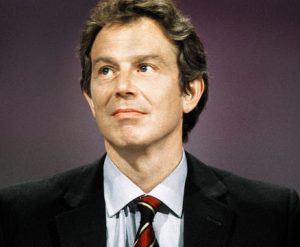
Tony Blair
Clearly, even after a third election defeat there was still strong resistance, from both the “soft” and the “hard left”, to the idea of embracing markets and private property.
After the next election defeat in 1992, Kinnock stood down. He was replaced by John Smith, who died tragically from a heart attack. Then Tony Blair became leader, with a firm resolve to modernize the party. Four election defeats had made the majority of members more receptive to his ideas.
Blair’s Revision of Clause Four
In 1995, after 77 years, Clause Four was changed. Tony Blair successfully ended the Labour Party’s longstanding constitutional commitment to far-reaching common ownership. Tony Benn protested: “Labour’s heart is being cut out”. The new wording of “Clause IV: Aims and Values” began as follows:
“The Labour Party is a democratic socialist party. It believes that by the strength of our common endeavour we achieve more than we achieve alone, so as to create for each of us the means to realise our true potential and for all of us a community in which power, wealth and opportunity are in the hands of the many not the few; where the rights we enjoy reflect the duties we owe and where we live together freely, in a spirit of solidarity, tolerance and respect.”
The 1918 formulation did not use the word socialism – it had common ownership instead. Ironically, Blair introduced the term in 1995. But he attempted to change its meaning. He promoted “social-ism”, which now meant recognizing individuals as socially interdependent. It also signalled social justice, cohesion and equality of opportunity.
The new Clause Four continued, to make a significant statement in support of competiive markets and a private sector. Labour now stood for:
“A DYNAMIC ECONOMY, serving the public interest, in which the enterprise of the market and the rigour of competition are joined with the forces of partnership and co-operation to produce the wealth the nation needs and the opportunity for all to work and prosper with a thriving private sector and high-quality public services …”
The text went on to cover “a just society”, “an open democracy”, “a healthy environment” and “defence and security”.
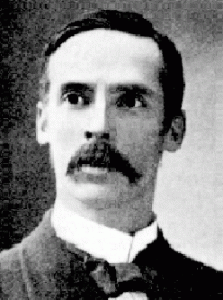
John A Hobson
Labour’s new aims and values were indistinguishable from the earlier views of radical social liberals, such as T. H. Green, J. A. Hobson and David Lloyd George. And with its endorsement of “the rigour of competition” and “a thriving private sector” it was a hundred miles away from the collectivism of Robert Owen and other original socialists.
Instead of tackling the problem of its old collectivist DNA more directly, Blair tried to change the meaning of socialism and even rewrote parts of its own history. It is unsurprising that the old socialist DNA survived. It remained viable, partly because Labour still declared itself as socialist. Blair made radical changes but also gave succour to the traditional socialist wing of the party.
Blair’s popularity within the party had waned even before his decision in 2003 to support George W. Bush’s Iraq War. Much of this disenchantment was due to his abandonment of wholesale common ownership.
Blair had failed to develop a fully-fledged alternative vision within Labour to replace old-fashioned common ownership. He had made Labour implicitly embrace liberalism in doctrine. But this was unspoken, and masked by the explicit insertion of socialism in its aims. This inadvertently played into the hands of the party’s enduring, backward-looking left.
Labour’s Love Lost
Just as Labour had shifted to the left after losing power in 1979, after its 2010 defeat it shifted slightly leftwards under Ed Miliband. But the new leader had no clear alternative to the economics of austerity. So after another defeat in 2015. the party membership took a massive lunge to the left. It elected the Bennite, retro-Marxist, perennial protestor, Jeremy Corbyn.
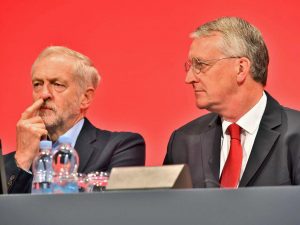 But while old ideas within Labour had survived, the structure of the party and its electoral base had changed enormously in the period from 1983 to 2015. Kinnock had relied on the moderating force of the trade unions, to fight the hard left and move the party toward electability. But by 2015 the unions had been gravely weakened and several had moved toward the hard left.
But while old ideas within Labour had survived, the structure of the party and its electoral base had changed enormously in the period from 1983 to 2015. Kinnock had relied on the moderating force of the trade unions, to fight the hard left and move the party toward electability. But by 2015 the unions had been gravely weakened and several had moved toward the hard left.
In 1983, both the affiliated unions and the Labour MPs had a major role in the election of any new Labour leader. But by 2015 the power was almost entirely in the hands of the Labour Party membership, and the other moderating forces were much diminished.
Labour’s history shows how difficult it has been to change Labour’s old-fashioned socialist DNA. Those that put their faith in a revival of moderation within must take into account the near-collapse of those internal forces that brought the party back to sanity in 1951-1964 and in 1979-1997.
In 1983 there was still a strong, traditional, tribal, Labour vote, part of it based on surviving industries such as coal and steel. By 2015 the working class was much more fragmented, with skilled, aspirational cohorts at one extreme, and uneducated, demoralized, welfare dependents at the other.
The old tribalism was challenged by UKIP and by a revived working class Conservatism, playing the nationalist card. Labour’s potential electoral base has been transformed beyond recognition. The division of labour has become profoundly political, as well as enduringly economic.
Today, there seems little hope for a party that calls itself “Labour”, just as there is no future for a party that retains the word “socialism” or the goal of widespread public ownership. The socialist experiments of the twentieth century testify to their failure. Labour, in short, is an anachronism.
8 May 2017
|
This book elaborates on some of the political issues raised in this blog:
Wrong Turnings: How the Left Got Lost
Published by University of Chicago Press in January 2018
|
References
Attlee, Clement R. (1937) The Labour Party in Perspective (London: Gollancz).
Blair, Tony (1994) Socialism, Fabian Pamphlet 565 (London: Fabian Society).
Clarke, Peter (1978) Liberals and Social Democrats (Cambridge: Cambridge University Press).
Hodgson, Geoffrey M. (1984) The Democratic Economy: A New Look at Planning, Markets and Power (Harmondsworth: Penguin).
Hodgson, Geoffrey M. (2017) Wrong Turnings: How the Left Got Lost (Chicago: University of Chicago Press, forthcoming).
Nove, Alexander (1983) The Economics of Feasible Socialism (London: George Allen and Unwin).
Toye, Richard (2004) ‘The Smallest Party in History’? New Labour in Historical Perspective’, Labour History Review, 69(1), April, pp. 83-104.
Posted in Common ownership, Democracy, Jeremy Corbyn, Karl Marx, Labour Party, Left politics, Liberalism, Markets, Nationalization, Politics, Private enterprise, Property, Robert Owen, Socialism, Tony Benn, Tony Blair, Tony Blair
April 28th, 2017 by geoffhodgson1946
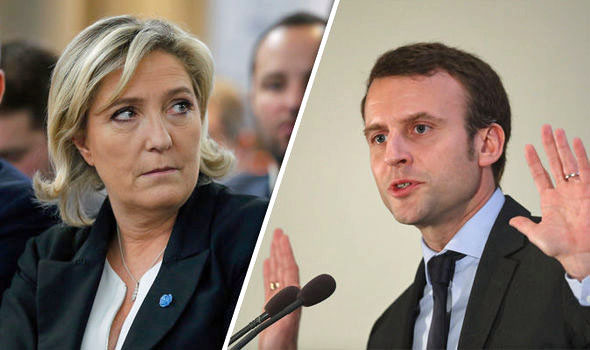
Geoffrey M. Hodgson
In the May 2017 run-off between Emmanuel Macron and Marine Le Pen, the defeated first-round candidate Jean-Luc Mélenchon refused to endorse the liberal Macron over the neo-fascist Le Pen. Many of Mélenchon’s leftist supporters did the same, arguing positively for abstention.

Jean-Luc Mélenchon
The abstainers argued widely that Macron is a “neoliberal” and the voters faced a choice between the dictatorship of the market or a fascist president.
This failure to perceive any advantage of a pro-market liberal over the racist and neo-fascist authoritarian nationalism of Le Pen’s National Front, is a symptom of a deep ideological sickness that has endured for decades on the French Left.
The political degeneration of the French Left, which even exceeds that of its Corbynista counterpart in Britain, would be the subject of another blog. My purpose here is to focus on the abuse of the term “neoliberalism” and how this corrupted and overly-widened word has poisoned political discourse.
I also wish to show how some “neoliberals”, who do not include Macron, and whom I shall attempt to characterise more precisely than the n-word will allow, do indeed have connections with genuine fascism.
After the erosion of credibility in classical socialism, particularly after its failed experiments in the twentieth century, it must be understood that our sole alternative to the rising nationalisms of Le Pen, Trump, Putin, Xi, Erdoğan and others is a modern and democratic version of liberalism. Whatever his flaws, Macron fits into the latter category.
The degeneration of the “neoliberalism” label
The widespread use of the word “neoliberal” to describe anyone accepting a significant role for private property or markets has made the word so imprecise that it has become useless and beyond reform.
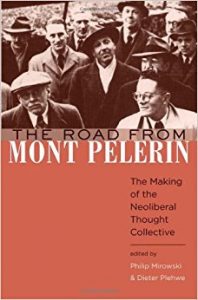 Even the foremost historians of “the neoliberal project” have acknowledged the problem. Philip Mirowski and Dieter Plehwe wrote:
Even the foremost historians of “the neoliberal project” have acknowledged the problem. Philip Mirowski and Dieter Plehwe wrote:
“We can sympathize with the impatience for those who use the term ‘neoliberalism’ as a blanket swearword for everything they despise, or a brainless synonym for modern capitalism.”
Colin Talbot pointed out that “neoliberalism” has become “a term of abuse” to be used against “any type of pro-market reform or political position that recognizes markets may – in the right circumstances – be a good thing”. Consequently, everyone “from moderate social democrats to the most lurid free-marketeers gets lumped together under a convenient ‘neoliberal’ label.”
In a superb survey of its usage since the 1980s, Rajesh Venugopal concluded that “neoliberalism has become a deeply problematic and incoherent term that has multiple and contradictory meanings, and thus has diminished analytical value.”
Some may wish to retain the “neoliberal” label, to apply it to those free marketeers who attempt to shrink radically the size of the state, to privatise anything that walks, advocate economic austerity and deregulate the financial sector. This would certainly separate neoliberalism from the genuine liberalism of John A. Hobson, William Beveridge or John Maynard Keynes.
But I think that things are too far gone to allow any useful redefinition of the “neoliberal” label to succeed. It is perhaps best abandoned. Instead I wish to focus on a particular strain of so-called “neoliberalism”. This allows us to concentrate on some key issues.
Ludwig von Mises and fascism
Ludwig von Mises (1881-1973) and Friedrich Hayek (1899-1992) were key figures in the so-called Austrian school of economics. Among their major achievements were their contributions to the “socialist calculation debate” where they showed the practical and epistemic limitations of any system of national planning based on comprehensive public ownership.
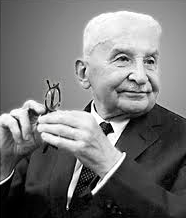
Ludwig von Mises
While sharing with liberals the support for a market economy based on private ownership, von Mises and Hayek departed from both classical liberalism (of John Stuart Mill, for example) and from twentieth-century liberalism (of John A. Hobson, John Dewey and John Maynard Keynes, for example), in some important respects.
In a book originally published in 1927, Ludwig von Mises praised fascism as “an emergency makeshift” that “has, for the moment, saved European civilization”. This statement cannot be excused, despite the facts that it was in a book that was otherwise devoted to the promotion of classical liberal values, and that von Mises was a Jew who eventually had to flee the Nazis.
From 1932 to 1934 von Mises continued as an economic adviser in Austria, even to the “Austro-fascist” or “clerical fascist” government of Chancellor Engelbert Dollfuss, who assumed dictatorial powers, closed down parliament, smashed the trade unions, and banned several political parties. This does not mean that von Mises was a fascist, but other economists would have drawn the line at advising them.
Friedrich Hayek and the dictatorship of Augusto Pinochet
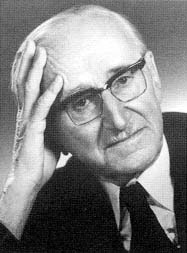
Friedrich Hayek
The idea that temporary dictatorships, even if murderous, might sometimes be necessary rubbed off onto von Mises’ student, Friedrich Hayek. Hayek argued that democracy, while desirable, can be temporarily dispensable, particularly in defence of private property.
Augusto Pinochet may have saved private property rights in Chile. But he imposed a vicious dictatorship that tortured an estimated thirty thousand civilians and murdered over three thousand.
The right to life, and freedom from torture, are existentially more basic, and hence even more important, than the right to property. Hayek visited Pinochet’s Chile and he failed to condemn these atrocious abuses of human rights. Hayek’s silence over abuses of basic human rights cannot be excused by his age: he was still publishing major books in the 1970s.
The twentieth century teaches us that Marxist socialism crushes human rights and leads to dictatorship. While opposing Communism, von Mises and Hayek (temporarily) tolerated some dictatorships and their removal of some basic human rights, including the rights of habeas corpus and to live without torture.
While earlier liberals had emphasized human rights, private property rights and democracy, in their reaction against socialism, von Mises and Hayek seemed to elevate private property rights over everything else. But private property rights require the protection of all actual or potential owners from torture or extermination. Basic human rights and democracy are vital, as well as the right to private property.
The Mont Pèlerin Society
The ideas of Mises and Hayek were prominent in the Mont Pèlerin Society, founded in Switzerland in 1947. The society accommodated a variety of views, including mainstream liberals plus some members who had collaborated with Nazism in the 1933-1945 period.
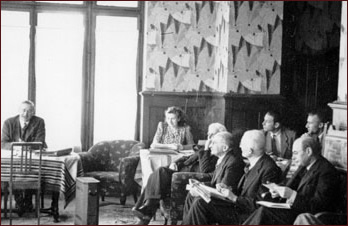 The Mont Pèlerin Society was dominated by economists. No less than eight winners of the Nobel Prize in economics have been its members.
The Mont Pèlerin Society was dominated by economists. No less than eight winners of the Nobel Prize in economics have been its members.
The influence of economists is evident in the draft statement of aims of the Society. It opened with these words:
“Individual freedom can be preserved only in a society in which an effective competitive market is the main agency for the direction of economic activity. Only the decentralization of control through private property in the means of production can prevent those concentrations of power which threaten individual freedom.”
Agoraphobics (i.e. fearers of markets) such as George Monbiot and Naomi Klein will probably disagree, but there is a vital truth in this quotation.
The trouble is that it is also a half-truth. Private property and markets are necessary but insufficient to guarantee liberty, as countless market-based totalitarian regimes, from Putin’s Russia to Pinochet’s Chile, will testify. The Mont Pèlerin statement should have made this clear. Instead it gave licence to a view that only private property and markets matter.

Margaret Thatcher and Augusto Pinochet
Hence Mont Pèlerin fans, including UK Prime Minister Margaret Thatcher and US President Ronald Reagan, supported dictatorships and opposed sanctions against South African Apartheid.
In 1999, Thatcher even thanked the former dictator Pinochet for “bringing democracy to Chile”. Clearly, while addressing someone who in 1973 overthrew a democratically-elected government, she invested the term “democracy” with an esoteric, Thatcherite meaning. In truth, Pinochet was a torturer and an assassin.
Vital differences between liberalism and Mont Pèlerin neoliberalism
Even with this brief account we can see some wide, clear water between mainstream liberals such as Macron and Mont Pèlerin “neoliberals” such as Hayek. Unlike those “neoliberals”, modern liberals uphold the following five points:
-
While markets and private property are essential, they are not sufficient to guarantee human rights and liberty. Vigilance and debate, within a democratic system with a free press, are necessary as well.
-
Dictatorships, would-be dictators and all abuses of human rights must all be condemned, in market-based as well as in centrally-planned societies.
-
-
Because the owners of capital and labour do not, and cannot, meet on a level playing field, some legally-limited trade-union activity is warranted, along with reasonable employment rights and other protections.1
-
While early liberalism was born in an era of small-scale producers, modern industrial capitalism bestows an economic (alongside a moral) need for organized mass education, social security and healthcare, along with regulations and bureaucracies to ensure that markets worked effectively and consumers are protected.
If these liberal principles were understood, along with Macron’s support for them, abstention in the May 2017 French presidential elections would be impossible.
28 April 2017
Minor edits 1, 4 May – thanks to Pedra Pereira Hors.
|
My forthcoming book elaborates on some of the political issues raised in this blog:
Wrong Turnings: How the Left Got Lost
To be published by University of Chicago Press in December 2017
|
Endnote
-
Note that Macron (like his Socialist Party predecessor François Hollande) wants to reform the blundering and counter-productive French system of employment law, rather than to abolish all employment rights, which must at least conform to standards within the European Union.
References
Caldwell, Bruce J. and Montes, Leonidas (2015) ‘Friedrich Hayek and his Visits to Chile’, Review of Austrian Economics, 28(3), pp. 261-309.
Hodgson, Geoffrey M. (2016) ‘Some Limitations of the Socialist Calculation Debate’, Schmollers Jarhbuch, 136, pp. 1-26.
Hodgson, Geoffrey M. (2017) Wrong Turnings: How the Left Got Lost (Chicago: University of Chicago Press, forthcoming).
Mirowski, Philip and Plehwe, Dieter (eds) (2015) The Road from Mont Pèlerin: The Making of the Neoliberal Thought Collective, paperback edition (Cambridge MA: Harvard University Press). (Quote from p. xvii.)
Mises, Ludwig von (1985) Liberalism in the Classic Tradition. Translated by Ralph Raico from the German edition of 1927 (Irvington, NY: Foundation for Economic Education). (See pages 47 and 51.)
Posted in Democracy, George Monbiot, Karl Marx, Left politics, Liberalism, Ludwig von Mises, Markets, Naomi Klein, Politics, Private enterprise, Property, Right politics, Socialism
April 17th, 2017 by geoffhodgson1946
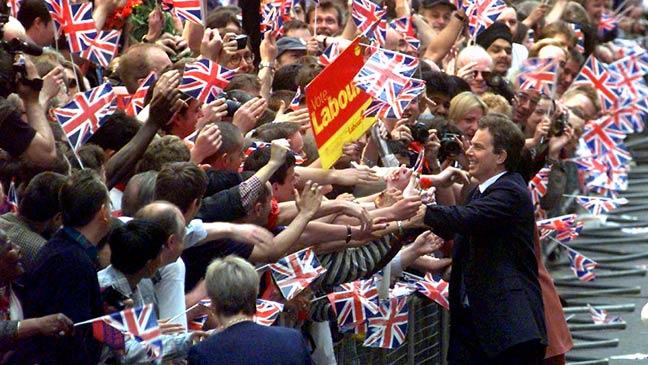
Geoffrey M. Hodgson
“Bliss was that dawn to be alive.” With Labour’s landslide victory under Tony Blair, the general election of 1st May 1997 ended eighteen years of Tory rule.
The new government set out to implement a series of major reforms, including establishing devolved assemblies in Scotland and Wales, setting a statutory minimum wage, and injecting much-needed money into the education system and the NHS.
After winning two further elections with large majorities – in 2001 and 2005 – Labour’s period of office came to an end on 5th May 2010, when the Conservatives became the biggest party in Parliament. The Liberal Democrats made the mistake of entering into a coalition with the Tories, and paid the price when they lost most of their MPs in 2015.
So began a period of Tory rule that now seems that it could last for decades. But the Tories rule with the support of less than 50 per cent of the voters. If Blair had implemented electoral reform, then what might have happened instead?
Ending “division among the radicals”
Until the day of polling in May 1997, when the scale of his majority became clear, Tony Blair had considered a coalition with the Liberal Democrats after the election, He had negotiated with Paddy Ashdown (the leader of the Liberal Democrats) with that possibility in mind. But once Blair’s overwhelming victory was apparent, a coalition with the Liberal Democrats seemed unnecessary.
 But Blair still wanted to cooperate with the Liberal Democrats on several issues, including on electoral reform. He insisted that the two parties were natural allies, and they should not have gone their separate ways a hundred years earlier. In his first speech to a Labour conference after his landslide election victory, Blair declared:
But Blair still wanted to cooperate with the Liberal Democrats on several issues, including on electoral reform. He insisted that the two parties were natural allies, and they should not have gone their separate ways a hundred years earlier. In his first speech to a Labour conference after his landslide election victory, Blair declared:
“my heroes aren’t just Ernie Bevin, Nye Bevan and Attlee. They are also Keynes, Beveridge, Lloyd George. Division among radicals almost one hundred years ago resulted in a 20th century dominated by Conservatives. I want the 21st century to be the century of the radicals.”
By “division among the radicals” Blair referred to the 1900 decision to set up a party in parliament independent of the Liberals. Blair wished to reverse that mistake and install an enduring radical majority.
Labour’s 1997 promise of electoral reform
Blair wanted Labour and the Liberal Democrats to work together for progressive change, and, if possible, to exclude permanently the Tories from government, at least until they were forced to modernise and to abandon their reactionary, inward-looking nationalism.
“We are committed to a referendum on the voting system for the House of Commons. An independent commission on voting systems will be appointed early to recommend a proportional alternative to the first-past-the-post system.”
After the election, Blair continued his secret talks with Ashdown on co-operation between their two parties, including on the issue of electoral reform.
But what voting system should be chosen?
One problem was that the two parties found it difficult to agree on what “a proportional alternative” might mean. But a possible compromise emerged with a top-up system called “AV+”.
In addition, under AV+, each voter would get a second vote to elect a regional-level representative from a list of candidates for each party. An additional group of MPs would be elected via this route. This “top up” would ensure greater proportionality in Parliament.
Some people dislike AV+ because it creates two types of MP, with not all of them being responsible for a manageable constituency. In addition, AV+ does not satisfy purists who want a more proportional system.
Division of Labour
But the biggest problem with Blair’s strategy for long-term reform was Labour itself.
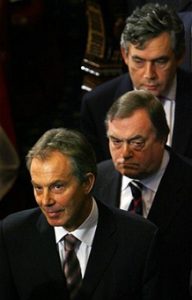 While leading figures in his Cabinet such as Robin Cook, Mo Mowlam, Clare Short and Peter Mandelson supported electoral reform, Blair faced the implacable opposition of Chancellor Gordon Brown, Deputy Prime Minister and Secretary of State John Prescott, Home Secretary Jack Straw, numerous trade union leaders and an energetic campaign against proportional representation from Labour’s ranks.
While leading figures in his Cabinet such as Robin Cook, Mo Mowlam, Clare Short and Peter Mandelson supported electoral reform, Blair faced the implacable opposition of Chancellor Gordon Brown, Deputy Prime Minister and Secretary of State John Prescott, Home Secretary Jack Straw, numerous trade union leaders and an energetic campaign against proportional representation from Labour’s ranks.
Reasons for this opposition to electoral reform within Labour were numerous. But perhaps the most enduring argument was that Labour saw itself as a party committed to radical change in favour of working people, which was bound to meet fierce opposition from rich vested interests and the reactionary press.
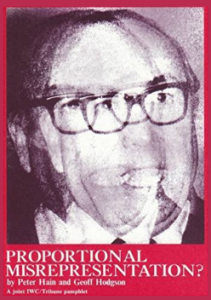 I can speak with a little authority here, because this was once my own major objection to proportional representation (PR). As loyal and active Labour party members, Peter Hain and I published a booklet in 1982 entitled Proportional Misrepresentation?
I can speak with a little authority here, because this was once my own major objection to proportional representation (PR). As loyal and active Labour party members, Peter Hain and I published a booklet in 1982 entitled Proportional Misrepresentation?
We argued that PR would favour parties of the centre, against parties like Labour who represented working people and were committed to radical change. The advantage of the existing system was that Labour could gain power and show piecemeal and in practice how socialist measures could work.
Although we were against PR, Peter and I argued for a change to the alternative vote (AV), without a top-up element. A few years’ later, Peter suggested that we develop our pamphlet into a book.
Thatcher in power
But this was after six years of Margaret Thatcher in power. Her Tory Party had won an overall majorities in 1979 and 1983, in both cases with less than 44 per cent of the vote. After 1983 I came to the view that Labour could not win the next election and the Tories could be power for about 15 years.1
 Just as the existing electoral system might be used by a left party for radical reform, it was being used by a newly-radicalised Tory party to divide the country, to undermine the welfare state and to attack the rights of working people.
Just as the existing electoral system might be used by a left party for radical reform, it was being used by a newly-radicalised Tory party to divide the country, to undermine the welfare state and to attack the rights of working people.
I had developed serious doubts about our 1982 arguments. So I declined Peter’s kind offer and he published the book in 1986 under his own name, fully acknowledging our previous joint arguments.
Others developed concerns similar to mine, especially as the years passed and the Tories remained in power with minority support. All this gave the impetus for Blair and others to push for PR in Labour’s 1997 manifesto.
But elements of Labour’s class-based tribalism remained strong, as did commitment to an ever-vague promise of something called “socialism” that only a majority Labour government could deliver. Hence Labour internally remained deeply divided on this issue, as it does to this day.
The Jenkins Commission
In December 1997, in line with the manifesto commitment, Blair set up a parliamentary commission under Lord Roy Jenkins, the former Labour minister and then Liberal Democrat peer. The Jenkins Commission would recommend which particular proportional system should be put before voters in a referendum.
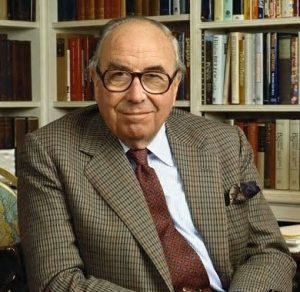 The Jenkins Commission reported in September 1998 and suggested the alternative vote top-up (AV+) system. Blair immediately faced intense opposition, from within his own Cabinet, from a large number of Labour MPs, from a large section of the Labour Party in the country, and from several trade unions.
The Jenkins Commission reported in September 1998 and suggested the alternative vote top-up (AV+) system. Blair immediately faced intense opposition, from within his own Cabinet, from a large number of Labour MPs, from a large section of the Labour Party in the country, and from several trade unions.
In 1997 Labour came to power with 43 per cent of the vote but won 63 per cent of the parliamentary seats. Any significant move toward greater proportionality would have deprived one hundred or more Labour MPs of their seats. Over one hundred turkeys would have to have voted for Christmas. The political barriers to this reform seemed unsurmountable. The recommendations of the Jenkins Commission were kicked into the long grass.
Several other attempts were taken to revive the project of electoral reform under the 1997-2010 Labour Government. Labour promised a review of the voting system in its 2001 manifesto. In 2003, talks were held between Labour and the Liberal Democrats on electoral reform.
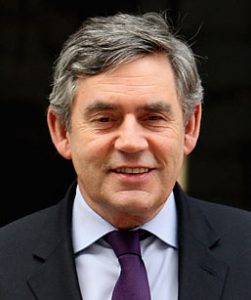
But by 2010, under the new premiership of Gordon Brown, Labour retreated from its earlier promise of moving toward proportionality. Instead, Brown promised a referendum on the alternative vote (AV) without any top-up element. The Jenkins Commission had previously taken the view that such a minor change would not merit a referendum.
In fact, a referendum on AV was held in 2011, under the coalition government. The proposal was defeated by a large majority. This demonstrated the problem of convincing the public of the merit if a more complex system, which cannot be explained easily in one or two sentences. I raise this issue later below.
An alternative future
First we consider what might have happened if the more-proportional system of AV+ had been introduced sometime between 1997 and 2010.
In the 2010 election Tories got 36 per cent of the vote, Labour got 29 per cent and the Liberal Democrats 23 per cent. Under the existing voting system they got 306 seats, 258 seats, and 57 seats respectively. Under a more proportional system they would have got something like 255 seats, 204 seats and 162 seats respectively
Under the existing electoral system, a 2010 coalition between Labour and the Liberal Democrats would have had 315 seats, which is well short of an overall majority in a parliament of 650 seats. It would have been a minority coalition government, or other parties would have had to been involved. This was a significant obstacle, which played a part in scuppering any 2010 deal between Labour and the Liberal Democrats.
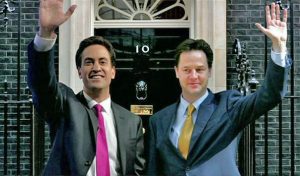 But if a more proportional system had been in place in 2010, then a coalition between Labour and the Liberal Democrats would have had something like 366 seats, which would have been a clear overall majority. The Tories could have been kept out of power.
But if a more proportional system had been in place in 2010, then a coalition between Labour and the Liberal Democrats would have had something like 366 seats, which would have been a clear overall majority. The Tories could have been kept out of power.
Furthermore, Labour would have been obliged to cooperate with a centrist party, giving weight and prestige to its more moderate wing. Sure enough, there would have been protest on the left, led by a Jeremy Corbyn or a John McDonnell, but they would have probably been kept away from Labour’s levers of power.
As the years followed, all sorts of alternative scenarios might have then unfolded. But a referendum on Brexit would have been unlikely, or it would have taken place under conditions more favourable to the Remain campaign.
In short, if the electoral system had been changed in this way before 2010, then we would not be in this mess that we are now. We could still be on the road to a progressive future, rather than fighting a desperate battle against intolerant bigots and nationalists, who would drive the UK economy off a cliff to satisfy an anti-immigration sentiment fed by years of economic failure.
Winning the battle for electoral reform
Electoral reform is highly unlikely under a Tory government and hence the first objective must be to remove the Conservatives from power. This will require a progressive alliance of Labour, Liberal Democrats and Greens, which at present does not seem feasible. Also the Tories might remain in power for some time.
 But a tiny consolation of this dismal entrapment is the time it gives us to debate the best system, which would offer something closer to proportionality, and would have a chance of convincing the electorate.
But a tiny consolation of this dismal entrapment is the time it gives us to debate the best system, which would offer something closer to proportionality, and would have a chance of convincing the electorate.
Some kind of top-up system based on 400-500 single-member constituencies, topped up with a further 100-200 MPs elected from party lists, seems the best way forward. It is a possible compromise that the parties involved can accept, and it is understandable by the public.
But I have now come to the view that the use of AV to elect the MPs for the single-member constituencies is both intrinsically flawed and difficult to explain to the electorate. A better and easier-to-explain alternative exists.
There were several reasons why the AV referendum was lost in 2011, including the fact that many prominent figures in the Labour Party openly opposed it. Another was the complexity of AV itself. As Tom Clark wrote in the Guardian:
“Leaflets from the electoral commission, which were designed to explain what the reform would mean to every household with meticulous neutrality, ended up making AV look horrendously complex. The blurb summed up first-past-the-post in just three sentences, while describing AV with an excessively complex example election, which required three diagrams and text that spilled over four pages.”
A further problem is that AV itself, even if it can be explained to the public, has serious intrinsic flaws.
Why AV is flawed
The alternative vote (AV) is widely criticised by experts on voting systems. We are concerned with systems designed to elect one person, from a list of candidates, to a single position or seat.
Consider an example of a mayoral election with three candidates Ms Left, Ms Centre and Ms Right. Both Ms Left and Ms Right are pretty extreme, and the electorate is polarised. An AV systems is employed and the candidates get the following first-preference votes: Left 33 per cent, Centre 31 per cent and Right 36 per cent. Under the AV system Ms Centre would be eliminated and her second preferences would be allocated to Left or Right. One of the more extreme candidates would win, in a run-off between Left and Right.
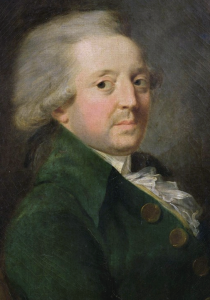
Nicolas de Condorcet
But imagine a local newspaper had run an extensive poll which showed that if there had been a run-off between Centre and Right, then Centre would have won. And if there had been a run-off between Centre and Left, then Centre again would have won. In other words, a majority in all cases preferred Ms Centre to any of the extremes.
Technically this is known as a Condorcet winner – a person who would win all two-candidate elections against each of the other candidates in turn.2 A serious problem with AV is that it can often eliminate a Condorcet winner. More generally, a major problem with AV is that it can often militate against strong and popular compromise candidates.
Why Approval Voting is better than AV
If there were (say) four candidates for a parliamentary seat, then the electors may vote (with crosses rather than numbers) for zero, one, two, three or four of the candidates. The votes for each candidate are added up, and the candidate with the highest number of votes is elected. Simple.
Of course, an elector voting for none or four of the candidates in this case would have no effect on the result, except he or she would be helping to give an overall indication of the overall level of approval (or lack of it) for each candidate.
As well as its technical superiority, a huge advantage of approval voting is that it is much easier to explain and to understand.
My proposal is for an approval voting system for single-member constituencies, plus a party-list top-up in regional units, to move closer to proportionality. I propose Approval+.
High stakes
Rising above the technical details, a lot is at stake here. If a more proportional system had been introduced in 1997-2010 then we could have avoided the disastrous prospect of decades of Tory rule, elected each time on 40 per cent or less of the vote.
When asked, the UK public support a more proportional system. A 2015 poll showed that 57 per cent of the public agreed with the principle that “the number of seats a party gets should broadly reflect its proportion of the total votes cast” – compared to only 9 per cent who disagreed.
We need to think about the best and most persuasive system of electoral reform, and set about the task of building a progressive alliance to implement it.
17 April 2017
Minor edits – 18 April, 1, 13, 14 May, 6 June, 14 July, 12 August, 3 September 2017
Footnotes
1. I turned out to be too optimistic: the Tories were in power for 18 years. Using a statistical analysis, I developed my sceptical 1980s view of Labour’s chances while I was on the ruling council of the Labour Coordinating Committee. My assessment was unpopular among budding, ambitious Labour politicians.
2. Nicolas de Condorcet (1743-1794) was a French revolutionary, mathematician, advocate of female suffrage and friend of Thomas Paine.
3. This is a very useful but long video. To cut straight to Approval Voting, the first 36 minutes may be skipped.
References
Hain, Peter and Hodgson, Geoff (1982) Proportional Misrepresentation? (London and Nottingham: Tribune and Institute for Workers Control).
Hain, Peter (1986) Proportional Misrepresentation: The Case against PR in Britain (Guildford: Wildwood House).
Posted in Brexit, Jeremy Corbyn, Labour Party, Left politics, Liberalism, Tony Blair, Tony Blair, Uncategorized
March 26th, 2017 by geoffhodgson1946

Geoffrey M. Hodgson
A quiz
Where are these quotes found?
“If a man has sexual relations with a man as one does with a woman, both of them have done what is detestable. They are to be put to death; their blood will be on their own heads.”
“If a man takes a wife … [and] did not find proof of her virginity. … If … the charge is true and no proof of the young woman’s virginity can be found, she shall be brought to the door of her father’s house and there the men of her town shall stone her to death.”
“When you go out to battle against your enemies, and the … God delivers them into your hands and you take them away captive, and see among the captives a beautiful woman, and have a desire for her and would take her as a wife for yourself, then you shall bring her home to your house, and she shall shave her head and trim her nails.”
“If two men, a man and his countryman, are struggling together, and the wife of one comes near to deliver her husband from the hand of the one who is striking him, and puts out her hand and seizes his genitals, then you shall cut off her hand; you shall not show pity.”
“If you hear in one of your cities … anyone saying that some worthless men have gone out from among you and have seduced the inhabitants of their city, saying, ‘Let us go and serve other gods’ … then you shall investigate and search out and inquire thoroughly. If it is true … you shall surely strike the inhabitants of that city with the edge of the sword, utterly destroying it and all that is in it …”
“A woman must learn in quietness and full submissiveness. I do not permit a woman to teach or exercise authority over a man; she is to remain quiet.”
All six quotes are from the Bible: the sixth is from its New Testament (see, respectively, Leviticus 20:13, Deuteronomy 22:21, Deuteronomy 21:11, Deuteronomy 25:12, Deuteronomy 13:12-15, Timothy 2:1). None of these quotes is from the Qur’an.
During March 2017 on Twitter I asked people to identify the source of each quote. In each case a minority (of between 7 and 25 per cent) guessed (wrongly) that the quote might be from the Qur’an. A majority identified the correct source in the case of the first, second and fifth quotes only.
The source of each quote can be easily discovered via Google. Maybe some people checked online before voting. In which case the unaided errors are likely to be larger.
Addressing this quiz, I wish to make two points. The first concerns equitable treatment of religious texts. The second concerns the possibilities of reform in different religions. The second point is more complex than the first.
Anti-Muslim prejudice
It is quite rare to find people quoting statements like the above from the Bible. But herein lies a contradiction. Muslims are often judged by their religious texts, but the same standards are less widely applied to Christians.
Sadly, in these dangerous times, there is a rising tide of anti-Muslim prejudice. To fuel this, some quote such inequitable or punitive statements from the Qur’an or Hadith, some chilling in their medieval intolerance. People should be aware of all the important messages in the Qur’an. But they should also be aware that the Bible is equally discriminatory and punitive.
Neither does the New Testament absolve Christianity. The religious laws in the Old Testament were not overturned by the New. Jesus himself is reported as saying: “Think not that I am come to destroy the law, or the prophets: I am not come to destroy, but to fulfil. … Till heaven and earth pass, one jot or one tittle shall in no wise pass from the law, till all be fulfilled” (Matthew 5:17-18). St Paul in Colossians (3:18) and in Ephesians (5:22-24) instructed women to submit to the commands and desires of their husbands.
Anti-Muslim bigots want to stop Islam but they do not want to offend Christians. Yet Christianity too has been responsible for a great deal of discrimination around the world. Its ancient punitive laws are no better than those found in Islam. Many Christians have moved on, to preach love and charity. But my initial point here concerns the texts themselves.
The intention here is not to let Islam off the hook. Quotes can be found in Islam’s Qur’an or Hadith that are discriminatory or brutally punitive.
If anti-Muslim bigots were really concerned about some aspects of Islamic religious law, then they should show the same concern about backward statements in the Bible, which are supported by some fundamentalist Christians. All religions have problems – not just Islam.
To defeat the hard right we have to acknowledge that there are popular fears about Islam, albeit often ungrounded in fact. Simply decrying such worries as racist, especially in the wake of terrorist attacks by alleged Muslims, helps to amplify the right-populist fear that elites are covering up the truth. While vigorously defending the universal right of peaceful worship, we should be able discuss the flaws in any religion.
Religion and law
Some problems with religion are bigger than others. These concern not simply the written word itself, but how it is interpreted and the extent to which it is followed. Here there are important differences between major religions.
This leads me to my second point deriving from the quiz above. This point requires an examination of the institutional nature of a religion and its relation to law.
For most (sadly not all) Christians and Jews today, the Old Testament is no longer regarded as supreme law. It does not overturn state laws. Believers are not generally obliged by their religion to punish those that break its rules. Believers agree to accept the authority of democratic states, even if they contradict their religion.
Crucially, despite sharing its Abrahamic roots with Judaism and Christianity, Islam currently sustains a different relationship between law and society. Those that miss-label criticism of Islam as “racism” inadvertently and inappropriately shift attention onto ethnic or racial characteristics, thus ignoring the social rules and norms that religions infuse into cultures.
We need to consider how a religion works, at the level of the promulgation and practical enforcement of its social rules.
The evolution of Christianity
Christianity became the dominant religion in the West when, in the fourth century AD, the Roman Emperor Constantine favoured it, and suppressed other religions. Established as the official religion of the Roman and Byzantine empires, it came to dominate the elites of medieval Europe and spread via colonialism to other continents. Although some were willing converts, many other ordinary people were obliged to become Christian because their rulers hitched onto that faith. It was largely a top-down process, often imposed by higher authorities.
In Christian Europe most ordinary people were denied access to the Biblical texts until the Reformation. In England the Bible was not widely available in English until the seventeenth century, at a time when a large majority of the population were illiterate. The Bible was used selectively and deviously by those in power, to maintain the authority of the state and of the nobility. They did not devolve matters of judgement or punishment to ordinary people.
The chronic disadvantage of the ruling-class monopoly of access to religious texts in Christian Europe was the suppression and ignorance of the population. But the top-down imposition of Christianity did allow for more flexibility. Official doctrine could shift as new circumstances and interests emerged.
When mass education belatedly spread in Europe in the late nineteenth century, its peoples were already entering a more secular and enlightened age.
The adaptability of Judaism
Even before the destruction of Jerusalem by the Romans in 70 AD, the Jews were dispersed throughout the Roman Empire. Catastrophic destruction in their homeland in Judea led to a further diaspora. The Jews were always in a minority in the places that they were tolerated. They retained their religion and customs, but otherwise adapted as much as possible to local laws and traditions.
For example, laws that required them to kill apostates (Deuteronomy 13:6-10) were eventually abandoned in deference to the laws in their host country. Adaptation was the necessary (but sadly sometimes insufficient) price for their survival.
Dispersed from their homeland, the Jews had to survive as minorities within other states. While keeping their religion, they otherwise adapted to local laws and customs.
Enforcement mechanisms in Islam
By contrast to Christianity, Islam has remained to a large degree a devolved system, with rules enforced by religious conversion and the dedication of its adherents. It offers powerful incentives for conversion and strong disincentives against apostasy.
Islamic scriptures provide a complex legal system governing the spheres of work and civil society, as well as of the family. The enforcement of these rules relies primarily on religious adherence and devotion, with less reliance on legal authority buttressed by the state.
Islamic religious and legal rules developed in communities where states were often weak and societies were fragmented into tribes and clans. Although Islamic legal texts decree that rulers have the duty to enforce laws, many of these laws are derived from religious sources and believers also have an obligation to enforce them.
Islam spread over a vast territory, encompassing many different languages and ethnicities. It did not rely on a strong, centralized, state apparatus. The shared, engrained, cultural dedication to religious rules made a smaller state possible.
Consequently, many legal rules in Islam are enforced bottom-up, by the authority of God as devolved to believers, rather than top-down by the authority of courts or governments.
Islam’s problems with modernisation
Despite its enormous cultural and scholastic achievements, especially from the eight to the thirteenth centuries, Islam turned out to be less adaptable than Christianity or Judaism. It relied on educated local observance from the bottom up. Within a state it was typically the religion of the majority rather than a minority.
Although there was scope for different interpretations, the Islamic fusion of law with religion created a largely conservative system of belief. In addition, the devolution of rights of legal judgment and punishment to individual believers contrasts with legal norms in the modern West, where citizens are prohibited from taking the law into their own hands.
A key problem with Islam is that many of its adherents have not yet modernized and accepted the practical supremacy of secular law. Backward cultural practices, often transmitted from less-developed countries with weak legal systems, have survived among Muslims, and are sustained by the religious customs of immigrant communities. Many Muslims do not accept the authority of secular law and democratic government above that of their religion. Many Muslims live in, or originate from, underdeveloped countries that have not experienced an equivalent of the Enlightenment.
Although the overwhelming majority of Muslim immigrants in developed countries comply with the law and shun violence, some still put religion above law and above democracy. Within this group there are some violent extremists.
This problem stems from the religiously-motivated, devolved mechanisms of reactionary rule-enforcement and punishment within Islam. We should recognize this problem, as well as the hugely valuable, past, present and potential contributions of Islamic culture to Western democracies.
The Muslim reformers
We should support the efforts of those Muslims that are trying to reform and modernise Islam, just as Christians and Jews have largely accepted the authority of secular law. We should not simply oppose all criticism of Islam, for fear that it might offend or cause division. Instead, we should add our voice to the modernisers, in their struggle against fundamentalists and conservatives.
The reformers have issued a Declaration defending gender equality, freedom of speech and freedom of religion, stating that they are for “secular governance” and “against political movements in the name of religion.” They have called for the separation of “mosque and state”, so that law rests on secular rather than religious authority. This is the route towards a tolerant and inclusive society, within a framework of universal human rights, democracy and secular law.
Accordingly, we can accept multiculturalism if it means recognition of cultural diversity, but we cannot accept multi-legalism. Diverse peoples must live together, but within a single framework of law, under a democratic political system.
Conclusion
Unreformed and discriminatory versions of Islamic law represent a problem for any society that is based on Enlightenment principles, and which requires obedience to laws that are enacted by the state. It creates major difficulties for integration and assimilation.
We must, of course, protect the freedoms of Muslims and others to worship, to express themselves, and to obtain a livelihood. Cultural and religious diversity can greatly enrich a modern nation, but only if the state legal system and over-arching secular values remain healthy and intact. Such a diverse society requires a just legal system and strong secular values, not least to protect the human rights of members of minority religions or ethnicities.
The strident but imprecise rhetoric of “Islamophobia” – advanced among others by politicians trying to capture the votes of Muslims in Western democracies – has blocked serious discussion of the merits and demerits of Islamic institutions. It can undermine careful and scholarly attempts by Muslims and others to identify where these institutions are in need of reform.
It cannot be repeated often enough that informed criticism of some Islamic rules or practices is not equivalent to bigotry toward Muslims. Racism, and persecution of Muslims, are serious problems and should be vigilantly opposed. But the option to criticise Islam, Christianity or any other set of beliefs, is an important human right, and it should be protected.
26 March 2017
Minor edits – 5 June 2017
|
This book elaborates on some of the political issues raised in this blog:
Wrong Turnings: How the Left Got Lost
Published by University of Chicago Press in January 2018
|
Posted in Assimilation, Christianity, Democracy, Immigration, Islam, Judaism, Left politics, Liberalism, Politics, Religion
February 21st, 2017 by geoffhodgson1946
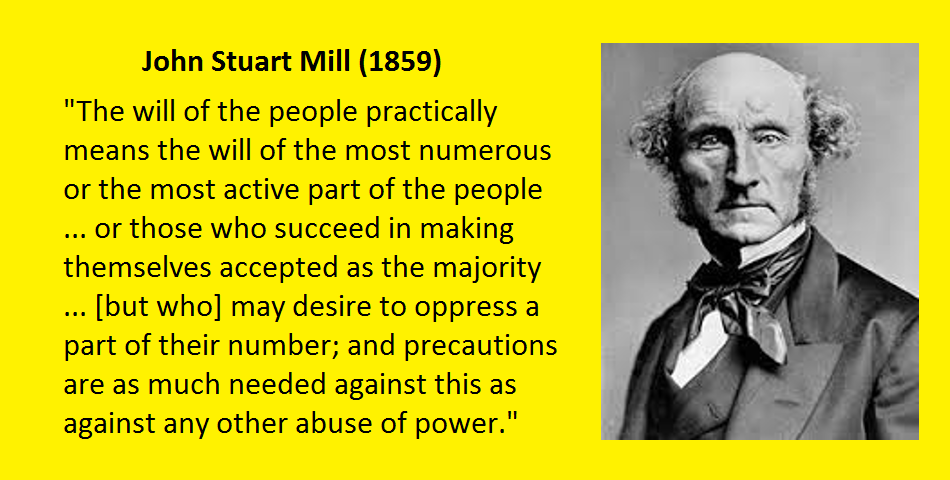
Geoffrey M. Hodgson
Despite her previous opposition to Brexit, Prime Minister Theresa May tells us that the UK must quit the European Union because it is “the will of the people”. Despite aligning himself in the Remain campaign during the referendum, opposition leader Jeremy Corbyn says that we must pursue Brexit because it is “the will of the people”. Many Labour MPs, who are critical of Corbyn and believe that leaving the EU will be a disaster, voted to start the exit process, without any guarantees or conditions, because it is “the will of the people”.
This is now the dreadful state of our democracy. On crucial matters such as immigration and Brexit, we are governed by tabloid headlines, opinion polls and lie-infested referendums. The “will of the people” has become the catch-phrase of the cowering, lazy or unprincipled politician. No longer driven by truth or principle, many of them knowingly connive in disaster because it is regarded as the peoples’ will.
Where can following “the will of the people” lead?
Polls show that the use of torture has sometimes, even recently, received majority support from the US public. President Donald Trump was elected after expressing a desire to re-introduce torture. Torture is “the will of the American people” – as some might put it.
But the use of torture has been against the Eighth Amendment to the United States Constitution since 1791. The very role of a constitution is to help protect rights and freedoms, even if “the will of the people”, or of a deviant President or Prime Minister, would take them away. One of the limits to democracy is that it should not be able to overturn our human rights.
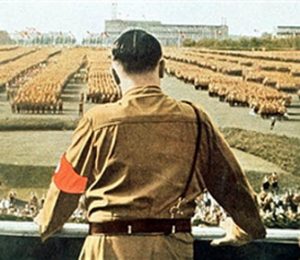 Dictators and populists are fond of referendums because they deploy “the will of the people” against constitutional safeguards. Hitler held a referendum in 1933, to garner mass support to withdraw from the League of Nations. In 1934 he held another referendum, which endorsed his bid for supreme power in Germany. Yet another referendum in 1936 ratified Hitler’s military occupation of the Rhineland and his one-party state. A fourth referendum in 1938 approved Hitler’s annexation of Austria. All propositions in these plebiscites received huge majorities.
Dictators and populists are fond of referendums because they deploy “the will of the people” against constitutional safeguards. Hitler held a referendum in 1933, to garner mass support to withdraw from the League of Nations. In 1934 he held another referendum, which endorsed his bid for supreme power in Germany. Yet another referendum in 1936 ratified Hitler’s military occupation of the Rhineland and his one-party state. A fourth referendum in 1938 approved Hitler’s annexation of Austria. All propositions in these plebiscites received huge majorities.
The death penalty
In recent polls in the USA, 60 per cent of the adult population supported the death penalty for murder, despite 64 per cent also believing that it does not lower the murder rate and 59 per cent believing that innocent people had been wrongly executed in the previous five years.
 In the UK in 1983, around 75 per cent of people were in favour of the death penalty. Although recent polls show a lower level of support, it is still close to 50 per cent.
In the UK in 1983, around 75 per cent of people were in favour of the death penalty. Although recent polls show a lower level of support, it is still close to 50 per cent.
Imagine that we had a referendum to re-introduce the death penalty in the UK. Thanks to some reactionary newspapers, it is possible that the proposal would gain majority support. But that does not justify its re-introduction, even if it was “the will of the people”. The morality of a law cannot be decided by popular vote.
Should homosexual acts be legal?
In some states of the USA there were laws prohibiting sodomy (between same-sex or different-sex couples) until 2003. As recently as 2004, the number of people polled in the USA who thought that homosexual acts should be illegal exceeded the number who thought they should be legal.
 By these measures, according to “the will of the people” homosexual acts should not have been made legal in 2003 or 2004.
By these measures, according to “the will of the people” homosexual acts should not have been made legal in 2003 or 2004.
But opinions change. This is another major problem with being governed by “the will of the people”.
After 2004, support in the USA for the legality of homosexual acts rose steadily. By 2016, the number supporting legality exceeded the contrary view by 40 per cent.
in the UK, as recently as 1998, 50 per cent of respondents in a poll thought that homosexual acts were “always” or “mostly” wrong, compared with 31 per cent saying they were “rarely” or never wrong.
Since then, opinion has switched, largely because leading politicians in the Tory as well as other major parties (with the notable exception of UKIP) have countered a sizeable segment of public opinion and underlined gay rights as a matter of principle.
By 2012, only 28 per cent of respondents in the UK thought that homosexual acts were “always” or “mostly” wrong, compared with 57 per cent saying they were “rarely” or never wrong. The will of the people can change.
The “will of the people” can be wrong or immoral
Whatever the “will of the people”, homosexual acts are either morally admissible or immoral. Moral principles are not determined by referendums or opinion polls.
 Instead, they must be the subject of ongoing, informed debate, guided by the need to minimise harm, alongside “an egalitarian conception of the good, focusing on equal opportunities for a worthwhile life” (as Philip Kitcher puts in his important book on The Ethical Project).
Instead, they must be the subject of ongoing, informed debate, guided by the need to minimise harm, alongside “an egalitarian conception of the good, focusing on equal opportunities for a worthwhile life” (as Philip Kitcher puts in his important book on The Ethical Project).
Consider another illustration. In 1984, 49 per cent of the UK public agreed “a man’s job is to earn money; a woman’s job is to look after the home and family”. But by 2012, only 13 per cent subscribed to this view.
Considerations of equal rights and equality of opportunity militate against such gendered attitudes and the discrimination that they sustain. While there is much more to be done, arguments have been won, opinions have changed and progress has been made. People can be persuaded that their previous opinions were wrong.
The need for experts
Just as votes cannot establish what is moral or immoral, they cannot determine what is scientifically valid and what is not. A majority of Americans would disregard claims concerning human-induced climate change. For many Americans, they are all part of a “hoax” to promote more intervention by the Federal Government.
Democratic votes cannot establish the veracity of scientific claims. Science proceeds through detailed scrutiny of claims by experts in a specialist field and a dialogue of different expert views. It thus creates an evolving consensus over what truths have been established and what research must be prioritised for further investigation.
 In the case of climate change, there is a strong consensus that human activity is leading to global warming. Albeit imperfect, this is the best indication we have of scientific truth. It is not the opinion of the general public, most of whom do not understand climate science.
In the case of climate change, there is a strong consensus that human activity is leading to global warming. Albeit imperfect, this is the best indication we have of scientific truth. It is not the opinion of the general public, most of whom do not understand climate science.
Another common fallacy, perpetrated by people who do not understand economics, is that we should treat the budgeting problems of a national economy in the same way that we treat our individual or household budgets. This is the “every housewife knows” economics of Margaret Thatcher and her ilk.
This mistaken view ignores the capacity of many sovereign states to issue money and sustain deficits: unlike individuals or firms, such states cannot go bankrupt. It ignores the fact that what may be true for an individual may not be true in the aggregate, as Keynesians and others have pointed out for decades.
Many economists (possibly most economists in the UK) accept this Keynesian argument. But it is difficult to get the point across to the general public, so that they elect governments that pursue austerity policies, which reduce aggregate demand and economic growth, leading to increased debt.
The role of democracy
If the behaviour of most British MPs over Brexit were taken as a guide, there would be no role for MPs at all. They blindly follow “the will of the people”, even when they know that it will lead to adverse economic and political outcomes.
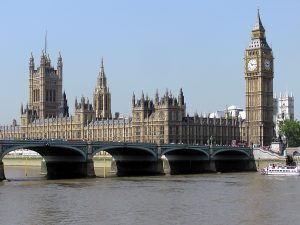 If this were a valid guiding rule, then MPs would be redundant. They could be replaced by online opinion polls on every question. The public would be invited to vote over every piece of legislation and “the will of the people” could be upheld.
If this were a valid guiding rule, then MPs would be redundant. They could be replaced by online opinion polls on every question. The public would be invited to vote over every piece of legislation and “the will of the people” could be upheld.
Before long we might be putting immigrants in sealed trains to remote or foreign destinations, and publicly flogging delinquents to teach them a lesson.
Democracy is vital not because it provides a means of implementing “the will of the people” on any specific proposal. The primary purpose of democracy is to legitimate government. It replaces unacceptable claims that rulers are legitimised by the “will of God” or by their family lineage.
There is a strong case for improving our democratic institutions, and the functioning of democracy itself. There are also forceful arguments for increasing participation in some local and workplace decisions, where we are intimately affected and have local knowledge. But there are severe practical and moral limits to the extension of democracy over all our affairs.
At least at the national level, in any large and complex socio-economic system, democracy must involve representatives rather than delegates. Representatives must be given some autonomy to seek expert advice and make judgments on complex issues. Extensive participatory democracy in such circumstances is both unfeasible and undesirable.
Members of Parliament receive a mandate from their electorates to represent their interests. Representing interests does not mean polling opinions: that is the lazy and irresponsible option. Instead it is a matter of exercising informed judgment. It is a question of deliberation and interpretation, involving the use of expert advice. We know that MPs often get things wrong. That is why their constituents have the opportunity to remove them at the next election.
The reactionary media are not solely to blame
The reactionary media and their malign influence on public opinion are not the sole cause of the current political malaise in Britain and the USA. Among others, one can blame the intellectually-lazy part of the Left, which trots out the mantra of “democratic control” whenever it sees a policy problem.
One can also blame the majority of economists, who have abandoned all moral considerations save for utility maximisation (or mere “satisfaction”) by “rational fools” (the term used by Nobel Laureate Amartya Sen).
Hence it is not just the reactionary media that are to blame. Many political activists have been intellectually lazy for too long. We need an enhanced and better-informed conversation concerning rights, morality and practical institutional design.
Armed with this knowledge, we need to hold our representatives to account, and expose the laziness and lack of principle of those who blindly follow “the will of the people”. If they see themselves as nothing more than unintelligent voting machines, then they should give up their positions to others, who would be guided by moral principles and offer greater dedication to the true interests of the people that they are supposed to serve.
21 February 2017
Minor edits – 28 February, 7 March, 4 May
|
This book elaborates on some of the political issues raised in this blog:
Wrong Turnings: How the Left Got Lost
Published by University of Chicago Press in January 2018
|
Bibliography
Hodgson, Geoffrey M. (2017) Wrong Turnings: How the Left Got Lost (Chicago: University of Chicago Press, forthcoming).
Kitcher, Philip (1993) The Advancement of Science: Science without Legend, Objectivity without Illusions (Oxford and New York: Oxford University Press).
Kitcher, Philip (2011) The Ethical Project (Cambridge MA: Harvard University Press).
Sen, Amartya K. (1977) ‘Rational Fools: A Critique of the Behavioral Foundations of Economic Theory’, Philosophy and Public Affairs, 6(4), pp. 317-44.
Posted in Brexit, Democracy, Left politics, Liberalism, Nationalization, Property, Uncategorized
January 28th, 2017 by geoffhodgson1946

Geoffrey M. Hodgson
The political earthquakes of 2016 are probably the beginning of a series of major ruptures in world politics. Donald Trump was elected in the USA, Britons voted for Brexit, Turkey lurched toward dictatorship, Brazil ejected a democratically-elected president, Russia extended its global influence, and China tightened internal security while building military bases in the South China Sea.
From America to Asia, authoritarian nationalism is on the march. The future of old alliances is cast in doubt, raising a renewed spectre of global war.
These seismic changes should prompt us to reconsider our priorities. Is ‘neoliberalism’ – whatever that means – our main enemy? Or is it rising authoritarianism and nationalism instead?
We have been here before, albeit with much less dangerous military weapons. The rival imperialisms of the nineteenth century led to the First World War. Collapsing imperial dynasties triggered revolution in Central and Eastern Europe. Communists successfully seized power in Russia in 1917. Post-war political and economic turbulence led to the triumph of fascism in Italy, Germany and Spain. Imperial Japan invaded nationalist China.
I am not suggesting that history will repeat itself in the same way. But it is important to understand how the tectonic plates of political change affected the way we understand and map political positions, and the way in which we prioritise political issues.
The thirty-year squeeze (1918-1948)
Europe suffered economic depression for much of the interwar period. The financial crash of 1929 exacerbated the crisis and led to a collapse of world trade. Liberal defenders of the market economy were put on the defensive: capitalism seemed at the end of its tether.

Beatrice & Sidney Webb
Meanwhile, some intellectuals from the USA and Britain – including Labour stalwarts George Bernard Shaw and Sidney and Beatrice Webb – visited the Soviet Union brought back glowing accounts of an expanding economy and a joyful population. (The Soviet propagandists explained away disasters such as the Ukranian Famine as resulting from sabotage by rich peasants or foreign agents.)
With the crisis of capitalism, the rise of fascism and the apparent success of Soviet Russia, many British and American radicals became Communists or fellow travellers. For them, liberalism and the defence of the market economy seemed a weak or unviable option.
The choice seemed to be between two forms of authoritarian government: much better the one that proclaimed equality and opposed racism. (But in reality, the Stalin regime promoted antisemitism, genocide against several other ethnic minorities, and dramatic internal inequalities of power.)
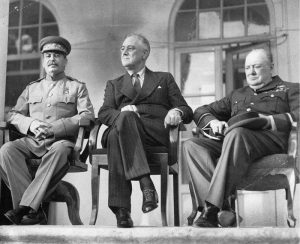
Stalin, Roosevelt and Churchill in 1941
The alliance between Russia and the West in the Second World War smothered criticism of what was really going on within Stalin’s regime. But, with the beginning of the Cold War in 1948, socialists were forced to make a choice between either supporting an antagonistic and undemocratic foreign power, or aligning with the USA and its allied democracies.
Labour under Clement Attlee aligned with the West. But rose-tinted visions of Soviet Russia or (from 1949) Mao’s China lived on among he Left.
In major European democracies, the thirty years between the end of the First World War and the start of the Cold War had seen liberalism squeezed, between socialism on the one hand, and reactionary authoritarianism on the other.
‘American imperialism’ and the rise of neoliberalism
Things were different in the USA, which polarised between forms of Republican conservatism and Democratic liberalism. But rising tensions in the Cold War, and the eruption of the Vietnam War in the 1960s, made American-style liberalism less attractive for the global Left.
 Marxist-led national liberation movements in Cuba, Indochina and elsewhere kept the collectivist vision alive for the Left around the world. Liberalism was see as the fake ideology of American imperialism and the global bourgeoisie.
Marxist-led national liberation movements in Cuba, Indochina and elsewhere kept the collectivist vision alive for the Left around the world. Liberalism was see as the fake ideology of American imperialism and the global bourgeoisie.
Some have argued that neoliberalism was reborn in the 1970s, when conservatives such as Ronald Reagan and Margaret Thatcher adopted a vision of expanding markets and a contracting state. Although the Left could never agree on what ‘neoliberalism’ meant, they mostly agreed that it was the main enemy.
Much of the Left, throughout the world, had never got rid of its agoraphobia – its fear of markets. Private enterprise and market forces were always and everywhere seen as the problem. Liberals, who defended private property and markets as well as human rights, were mocked as the bourgeois enemy.
Our brave new world
But the global tectonic plates are now shifting abruptly, in an erupting national and international crisis, as big as anything since 1948.
Nationalist leaders strut around the world stage. They stock up their nuclear and conventional arsenals and jostle for geopolitical advantage.
Torture is endorsed. Journalists are threatened or imprisoned. Scientific findings on climate change are denied. Intellectuals and experts are ridiculed. Ignorance and dogma are celebrated. Truth is swamped by lies. Legislation protecting workers and the poor is undone. Minorities are attacked and made scapegoats. Racism is given licence. People suffer discrimination on the basis of their religious or other beliefs. Democratic systems are damaged. Judges and lawyers are treated as traitors. The rule of law is undermined.
In this dangerous new world, it matters less whether that railway is nationalised or whether water distribution is in public ownership. Forms of ownership are always secondary to the actual provision and distribution of vital goods and services. But when our rights and liberties can no longer be taken for granted, questions over forms of ownership move even further down the ranking of priorities.
The ubiquitous, trivialising idea that the Left is defined in terms of public provision, and Right as private provision, is historically recent and a gross reversal of their original meanings. It is also a polarisation of lesser relevance in this world of rising authoritarian nationalism.
Our fundamental rights, our liberty, and the rule of law are now increasingly threatened. Their defence becomes the great struggle of our time.
This lesson is hardest for Americans and Britons, who were spared domestically from the jackboots of twentieth-century despotism. Struggles for British and American national liberty are beyond living memory. We have grown fat and lazy on the fruits of the liberal order. We have taken for granted its institutions and underestimated their fragility. We must repair our vigilance.
The liberal opportunity
For 100 years, for the reasons given above, liberalism has been marginalised. Now is its opportunity – indeed its urgent necessity.
Unlike our grandparents in the crisis-ridden 1930s, we have seen the socialist experiments of the twentieth century and counted their cost at 90 million lives. History and social science have more to teach us. If we wish to learn, we can know more about how markets work. We can understand the informational, organisational and other impediments to comprehensive national planning. We can appreciate why countervailing politico-economic power, based on a strong private sector, are necessary to buttress democracy and resist authoritarianism. The twentieth century has taught us these lessons.
The old Marxist mantra of bourgeoisie versus proletariat is also ungrounded in reality. Instead we have a highly fragmented working class, much of it enduringly aligned with authoritarianism and nationalism. Marxism relies on a quasi-religious and nonsensical belief that the working class – whatever it actually believes or strives for – carries our human destiny.
Class struggle has mattered, but it has never been the main motor of history. What have mattered more have been struggles for power, by individuals, dynasties, nations, religions or ideological movements.
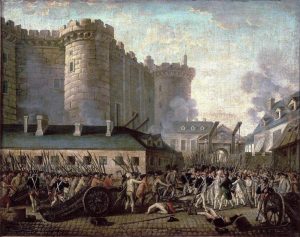
The Storming of the Bastille in 1789
Liberalism was one of those movements. Based on the imperatives of equality and liberty, it matured in the Enlightenment.
Liberalism rose up in the English Civil War of the 1640s, in the American Revolution of the 1770s, and in the French Revolution of 1789, in titanic struggles against despotism and oppression.
Now, once again, liberalism is centre stage, as the enemy of authoritarian nationalism.
The liberal rainbow
Its allies are not those who pander to authoritarianism by eroding civil liberties, or do the spadework of the nationalist Right by making immigration (rather than assimilation) a foremost problem. The prime allies of liberalism are all those who defend liberty and human rights. But therein lies a concern, which must be discussed.
From the beginning, liberalism has harboured different views on the role of the state and of the degree of state intervention required in the economy and society. On the one hand there are liberals – sometimes called libertarians – who wish to minimise the role of the state.

Thomas Paine
John Maynard Keynes – another great liberal – argued that state regulation of financial markets and counter-cyclical expenditures are necessary to stabilise the capitalist system. Keynes showed that economic austerity is a flawed doctrine. Government deficits are best reduced by growth: budget cuts can contract the entire economy and make the problem worse.
There is a spectrum of views between individualist and social-democratic liberalism, but all liberals are united in their defence of individual liberty, human rights and political democracy. The diverse colouring of this rainbow does not diminish its united opposition to the dark intolerance and division that is exacerbated by authoritarian nationalism.
The struggle for liberty and equality has always been vital. But many twentieth-century radicals were diverted by the delusions of socialism. The renewed rise of authoritarianism has shown us again that liberalism is the vital political movement of the modern age.
28 January 2017
Minor edits: 29 January, 1, 16 May 2017
|
This book by G. M. Hodgson elaborates on some of the political issues raised in this blog:
Wrong Turnings: How the Left Got Lost
Published by University of Chicago Press in January 2018
|
Bibliography
Allett, John (1981) New Liberalism: The Political Economy of J. A. Hobson (Toronto: University of Toronto Press).
Beveridge, William (1944) Full Employment in a Free Society (London: Constable).
Clarke, Peter (1978) Liberals and Social Democrats (Cambridge: Cambridge University Press).
Claeys, Gregory (1989) Thomas Paine: Social and Political Thought (London and New York: Routledge).
Courtois, Stéphane, Werth, Nicolas, Panné, Jean-Louis, Packowski, Andrzej, Bartošek, and Margolin, Jean-Louis (1999) The Black Book of Communism: Crimes, Terror, Repression (Cambridge MA: Harvard University Press).
Hodgson, Geoffrey M. (2015) Conceptualizing Capitalism: Institutions, Evolution, Future (Chicago: University of Chicago Press).
Hodgson, Geoffrey M. (2017) Wrong Turnings: How the Left Got Lost (Chicago: University of Chicago Press, forthcoming).
Keane, John (1995) Tom Paine: A Political Life (London: Bloomsbury).
Keynes, John Maynard (1936) The General Theory of Employment, Interest and Money (London: Macmillan).
McCloskey, Deirdre Nansen (2017) ‘Nationalism and Socialism Are Very Bad Ideas: But liberalism is a good one’, Reason.Com, February. http://reason.com/archives/2017/01/26/three-big-ideas
Monbiot, George (2016) ‘Neoliberalism – the ideology at the root of all our problems’, The Guardian, 15 April. https://www.theguardian.com/books/2016/apr/15/neoliberalism-ideology-problem-george-monbiot.
Townshend, Jules (1990) J. A. Hobson (Manchester: Manchester University Press).
Venugopal, Rajesh (2015) ‘Neoliberalism as a Concept’, Economy and Society, 44(2), pp. 165-87. http://www.tandfonline.com/doi/abs/10.1080/03085147.2015.1013356.
Posted in Brexit, Common ownership, Democracy, Donald Trump, Immigration, Karl Marx, Labour Party, Left politics, Liberalism, Markets, Nationalization, Politics, Populism, Private enterprise, Right politics, Socialism
January 5th, 2017 by geoffhodgson1946
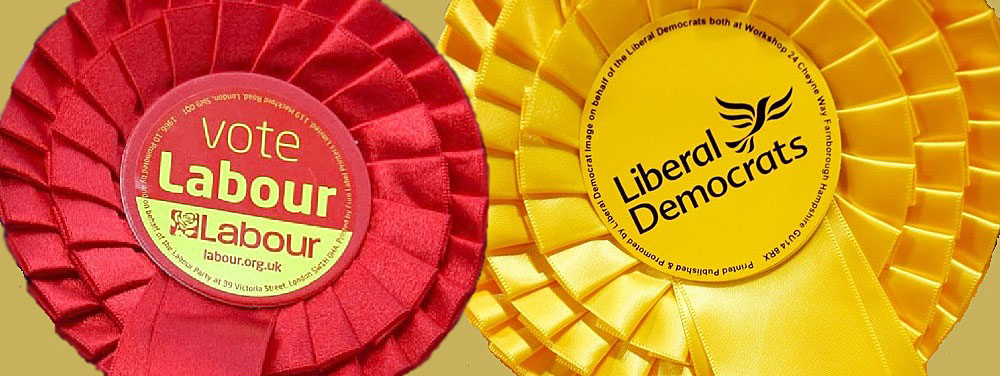
“Worth reading to show how Liberals have played their part in the development of much of Labour’s social and economic policies over the years” John Rogan
Geoffrey M. Hodgson
Labour did not win a majority in the 2017 general election. A future majority Labour government seems less likely than a progressive alliance of Labour with other parties.
But as Neal Lawson put it: “Labour’s tribalists, including its leader it seems, simply cannot stand the idea of working with others.” Furthermore, Britain’s unfair electoral system means that, even with 20 per cent of the vote in the new constituency boundaries, Labour could retain about 150 MPs, while the Liberal Democrats would be likely to get less than 50 MPs with the same share of the overall vote.
Labour’s tribalism and self-interest could transform it into a rump party of purists in permanent opposition, rather than as a serious engine of political power that can tackle the pressing problems of poverty, inequality, poor education, declining health services and global warming.
Labour has depended on Liberalism
My purpose here is to argue that such insularity is historically ungrounded. Furthermore, while Liberals too have their sins – from support of the First Word War to endorsement of Tory austerity in 2010-2015 – the very vitality and survival of the Labour Party has been largely due to Liberals and liberalism. Strange but true.
“Nonsense,” you might say: “Labour was built on the trade unions and the organised working class.” True. But what made strong trade unionism possible?
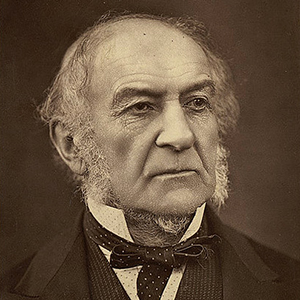
William Ewart Gladstone
Trade unions were made legal in the UK for the first time in 1871, under the Liberal Prime Minister William Ewart Gladstone. Gladstone also introduced the Representation of the People Act 1884, which extended the right to vote from roughly 28 per cent (in 1867) to about 60 per cent of adult males.
Liberals also introduced the Education Act of 1870, which established schooling for all children between the ages of 5 and 12 in England and Wales. (It was already instituted in Scotland.) This widened literacy and political awareness.
Liberalism in the nineteenth century made possible the widespread development of trade unionism and the election of working class members of parliament. Many of these reforms were prompted by the expansion of the industrial working class and fears of riot or revolution. The Lib-Lab dialectic has run both ways.
Gladstone was an individualistic Liberal, advocating low taxes and a minimal state. But from the origins of liberalism in the Enlightenment, there have co-existed welfarist, cooperative and redistributive strains within liberalism.

Thomas Paine
These include the proposals by Tom Paine (1737-1809) for welfare provision and redistributive wealth taxes. John Stuart Mill (1806-1883) supported taxes on unearned income, inheritance taxes, trade unions, worker cooperatives, participatory democracy, votes for women as well as men, and care for the natural environment. Thomas Henry Green (1836-1882) argued that the state should protect the social, political and economic environments in which individuals could freely develop. Liberalism has always fostered notions of social obligation beyond narrow self-interest.
As the male franchise was widened, Liberals recruited working-class candidates, including those financially maintained by trade unions. The first Lib-Lab candidate stood in the Southwark by-election of 1870. The Lib-Labs represented working class interests but remained within the Liberal Party.
But as socialist ideas became more widespread, some working-class leaders began to move away from the Liberals. The Independent Labour Party was formed in 1893 and it put up its own candidates in the 1895 general election. The ILP was involved in the formation of the Labour Representation Committee in 1900, which was renamed the Labour Party in 1906. This was the great schism between Labour and Liberalism.
Liberalism, solidarity and welfare
Gladstone’s resignation in 1894 was partly prompted by his opposition to the proposal by his Liberal chancellor Sir William Harcourt to introduce death duties – a substantial tax on property. These events dramatized the tension between individualist and redistributive-welfarist strands within liberalism. Even after Gladstone’s departure, the Liberal Party remained internally divided on these issues, and it suffered a cataclysmic defeat in the 1895 general election.
Liberals were also divided on the question of Irish home rule, imperialism and war. A faction of “Liberal Unionists” broke away to form their own party in 1886: they entered a coalition with the Tories in 1900 and later fused with them.
But this period also saw the rise of a “new” or “modern” liberalism in both Britain and the United States. It stressed the importance of economic equality, a welfare state and judicious state intervention in a market economy. A key British intellectual involved in this revival was John Atkinson Hobson (1858-1940).

John A Hobson
Frustrated by the Liberal Party divisions of the 1880s and 1890s, Hobson had been in favour of the formation of a new party, but by 1901 he was calling for an alliance between labour representatives such as Keir Hardie and “progressive” Liberals. But Hardie eventually came to the conclusion that his Independent Labour Party had “nothing in common” with the Liberals.
A revived Liberal Party won a huge election victory in 1906, and Hobson returned to working within its ranks. After the 1910 general election the Liberal Party did not have a majority and formed a coalition with 42 Labour Party MPs who had been elected. The Liberal Henry Campbell-Bannerman was Prime Minister until 1908, followed by Herbert Asquith, who was in power until 1916.
Aware of the need to retain and extend support among the working class, the 1906-1914 Liberal-led governments executed a series of major reforms and laid the foundations of the British welfare state. These reforms included the introduction of a state pension, compulsory health insurance, unemployment and sickness pay, an extension of free secondary education, and a reform of the House of Lords. As Chancellor of the Exchequer from 1908 to 1915, David Lloyd George was a key figure in the introduction of many of these reforms.
Liberal decline and Labour gain
Subsequently, the Liberal Party suffered a rapid decline. In his classic diagnosis, George Dangerfield put this down to the crises over Ireland, where the Liberals were unable to prevent violence and revolt, to the rise of the labour movement and industrial militancy, and to votes for women, over which the Liberal Party fatally hesitated. During the war, the Liberal government antagonised progressive support by introducing illiberal measures including conscription and restrictions on freedom of speech.
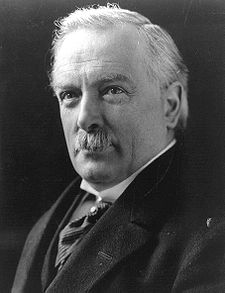
David Lloyd George
The Liberal Party split again in 1916, when a wing led by Lloyd George entered a coalition with the Conservatives. The presence of the new and vigorous Labour Party on the Left gave a new home to disenchanted Liberals. Hobson quit the Liberal party in 1916, later to dally with Labour. But he always advocated a mixed economy and insisted on the virtues of market competition and extensive private ownership.
The much-diminished Liberal group in Parliament propped up the minority Labour governments in 1924 and 1929.
The Liberal share of the vote slumped, falling as low as 10 per cent in 1931. In the interwar period, liberalism was ground down by the rising, opposed totalitarianisms of Communism and fascism. It had to wait to the 1970s to begin a long, slow and punctuated revival.
The Labour Party was built on the twin pillars of socialist ideology and strong trade unionism. It rose from 21 per cent of the vote in 1918 to 48 per cent of the vote in 1945.
But these pillars are inadequate. Trade unionism is important for the defence of worker’s rights and as a counterbalance to powerful corporate interests. But trade unionism does not a government build. It lacks the hegemonic capacity to unite diverse sectional interests in a fractured and class-divided society.
At the outset, Labour’s socialism offered no defence of a private sector or of private property. From 1918 to 1995, Labour’s Clause Four offered common but not private or mixed ownership.

Clement Attlee
In 1937, eight years before he became Prime Minister, Clement Attlee wrote of the “evils” of capitalism: their “cause is the private ownership of the means of life; the remedy is public ownership.” Attlee approvingly quoted the words of Bertrand Russell: “Socialism means the common ownership of land and capital together with a democratic form of government. … It involves the abolition of all unearned wealth and of all private control over the means of livelihood of the workers.”
It was possible to advance such views at the time, without much loss of popular appeal. The full horrors of Stalin’s Soviet Union were initially unappreciated and then masked by the Soviet alliance with Western powers in the Second World War. The unprecedented famines and other brutalities of Mao Zedong were yet to come.
Liberalism defined Labour in power
After 1945, the position of many leading Labour Party members began to shift. The realities of gaining and holding on to power – as a majority party for the first time – dramatized the political and practical unfeasibility of abolishing all private enterprise. Some nationalization was achieved, but a large private sector remained. Then the outbreak of the Cold War in 1948 impelled everyone to make a choice between capitalism and democracy on the one hand, and state ownership and totalitarianism on the other.
The twin pillars of trade unionism and Clause Four socialism could not, and never will, sustain Labour in power. Labour nationalized several industries, but hardly more than the Liberal Hobson had proposed as early as 1909.
The greatest achievement of the 1945-1951 Labour government was its massive development of the welfare state, upon the foundations laid down by the Liberals in 1906-1914. In this second round, Liberals still played a major role.
Beveridge, Keynes and social democracy
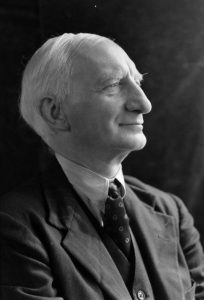
William Beveridge
William Beveridge (1879-1963) was originally close to the Fabians but, against the prevailing current, he moved toward the Liberals, and was briefly a Liberal MP from 1944-1945. His wartime Beveridge Report (1942) became the foundation Labour’s post-1945 welfare state.
Impelled by a strong vision of social justice, Beveridge proposed a system of universal national insurance, conferring benefits to people who were sick, unemployed, retired or widowed. He argued that this system would provide a minimum standard of living “below which no one should be allowed to fall”. His proposals were developed in conjunction with the plan for a National Health Service, as developed by the Ministry of Health.
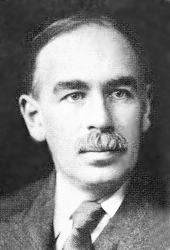
John Maynard Keynes
Near-full employment was pivotal to his system of social welfare. He expanded on this in his 1944 book Full Employment in a Free Society. In developing this goal, Beveridge relied explicitly on the policy approach developed by another great Liberal – John Maynard Keynes. Keynes was instrumental in instating full employment a major policy goal. In his General Theory of Employment, Interest and Money he provided the theoretical underpinnings of this policy.
Much of the success of the 1945-51 Labour government depended on Liberal ideas. The bland mantra of common ownership provided neither a theoretical rationale nor a practical grounding for detailed policy.
When the Labour government tackled the problems of poverty, inequality and unrealised human potential within actually existing capitalism, they turned to Liberal thinkers such as Hobson, Keynes and Beveridge, who had grappled with the policy issues for years.
Insofar as Labour became a social-democratic rather than a genuinely socialist party, it has done so by borrowing ideas from liberals. (Socialism today is too-often taken to mean almost anything, but it was originally defined by Robert Owen as the abolition of private property.)
Labour after 1951
The graph of Labour’s share of the vote shows a long decline from its peak in 1951 to the disastrous result in 1983. The Labour governments of 1964-1970 and 1974-1979 had seen major reforms under the premiership of Harold Wilson. From 1974 to 1979 there was a pact between the Liberals in Parliament and the Labour Government.
But the Labour pillar of trade unionism begat the strike wave in the so-called 1978-1979 Winter of Discontent, and Labour’s Clause Four mantra still hung around its neck.
These enhanced the conditions for the victory of Margaret Thatcher in the 1979 general election. With an inadequately-developed alternative ideology sustaining a mixed economy, Labour fell back on its founding twin pillars and lurched the Left. The result was the disaster of 1983 and Labour’s lowest share of the vote since 1918.
When Neil Kinnock became Labour leader in 1983 he pulled the party back from the brink. It took a further 14 years for Labour to recover sufficiently to win a general election.
The coalition that never was
Until the day of polling in May 1997, when the scale of his majority became clear, Tony Blair considered a coalition with the Liberal Democrats after the election, and negotiated with Paddy Ashdown on that possibility. In his first speech to a Labour conference after his landslide election victory, Blair declared:
“my heroes aren’t just Ernie Bevin, Nye Bevan and Attlee. They are also Keynes, Beveridge, Lloyd George. Division among radicals almost one hundred years ago resulted in a 20th century dominated by Conservatives. I want the 21st century to be the century of the radicals.”

Tony Blair
Blair of course referred to the 1900 decision to set up a party in parliament independent of the Liberals, to represent working people. Blair’s election victory was impelled by shift toward liberalism and an explicit rejection of classical socialism. He tackled the twin pillars of trade unionism and common ownership, upon which Labour was founded.
The opportunity of another coalition emerged after Labour’s loss of an overall majority in 2010. But instead, the Liberal Democrats turned to the Tories and formed a coalition with them. One reason for this choice was that the Liberal Democrats under Nick Clegg had abandoned their Keynesian heritage and accepted a strategy of economic austerity. This mistake cost the Liberal Democrats dearly in the 2015 election.
When Labour suffered a second successive defeat in 2015 it moved again to the Left, ending in 2015 and 2016 with the election and re-election of a hard leftist with little experience in government and a preference for slogans over both theoretical argument and practical details.
Around sixty percent of the membership voted for Jeremy Corbyn on these occasions, showing that Labour had retained its 1918 roots. This has created the conditions for a similar return to Labour’s 1918 share of the vote.
Conclusion: history in reverse
The Labour Party was founded in an era of mass industrial trade unionism and increasing ideological support for socialism, as classically defined. Both of these forces have been gravely weakened and are in dramatic decline. Traditional trade unionism has not simply been undermined by the anti-union legislation by Conservative governments. Trade unions face vastly transformed workplaces with a much more fragmented workforce, often engaged in tasks that require detailed experience and specialist skills. To survive, their role must be transformed.
But the unions have been slow to adapt to this new reality and have declined in strength. Where some disruptive power has been retained – such as on some parts of the railway system – they hasten the demise of their jobs and their replacement by robots.
The ideological appeal of classical socialism has been fatally undermined by the practical experiments in Russia, China, North Korea, Cambodia, Cuba, Venezuela and elsewhere. These experiments have without exception undermined human rights and have led to an estimated total of 90 million deaths.
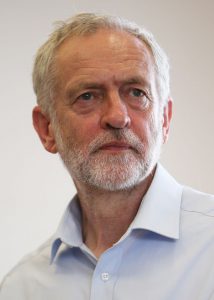
Jeremy Corbyn
From 1945 Labour was unable to rely on the twin pillars of trade unionism and socialism but it retained them nevertheless. Corbyn makes them central once again, but his anachronistic strategy is doomed to failure.
Labour’s problems are exacerbated by internal divisions over immigration, Brexit, defence and NATO (in a time of increasing international tension and insecurity). The Liberal Democrats alone speak for the 48 per cent that voted to remain in the European Union.
5 January 2017
Edited 6-8, 14 January, 1 July
|
My forthcoming book elaborates on some of the political issues raised in this blog:
Wrong Turnings: How the Left Got Lost
To be published by University of Chicago Press in November 2017
|
References
Allett, John (1981) New Liberalism: The Political Economy of J. A. Hobson (Toronto: University of Toronto Press).
Attlee, Clement R. (1937) The Labour Party in Perspective (London: Gollancz).
Beveridge, William (1944) Full Employment in a Free Society (London: Constable).
Clarke, Peter (1978) Liberals and Social Democrats (Cambridge: Cambridge University Press).
Dangerfield, George (1935) The Strange Death of Liberal England (London: Constable).
Harrop, Andrew (2017) ‘Stuck: How Labour is too weak to win, and too strong to die’, 3 January (London: Fabian Society). http://www.fabians.org.uk/wp-content/uploads/2016/12/Stuck-Fabian-Society-analysis-paper.pdf
Hobson, John A. (1909) The Crisis of Liberalism: New Issues of Democracy (London: King).
Hodgson, Geoffrey M. (2017) Wrong Turnings: How the Left Got Lost (Chicago: University of Chicago Press, forthcoming).
Keynes, John Maynard (1936) The General Theory of Employment, Interest and Money (London: Macmillan).
Lawson, Neil (2017) “Labour’s poll woes show why we need to do a deal with rival parties”, Labour List, 4 January. http://labourlist.org/2017/01/neal-lawson-labours-poll-woes-show-why-we-need-to-do-a-deal-with-rival-parties/
Townshend, Jules (1990) J. A. Hobson (Manchester: Manchester University Press).
Posted in Common ownership, Jeremy Corbyn, Labour Party, Left politics, Liberalism, Politics, Socialism, Tony Blair, Tony Blair


 I was at the LSE student occupation in 1967 and one of the Grosvenor Square demonstrations in 1968. In that year I copied Bertrand Russell and tore up my Labour Party membership card in protest against US aggression in Vietnam.
I was at the LSE student occupation in 1967 and one of the Grosvenor Square demonstrations in 1968. In that year I copied Bertrand Russell and tore up my Labour Party membership card in protest against US aggression in Vietnam.








 I am a radical liberal. I believe in social solidarity with the less-privileged, as well as in individual rights. As Charles Kennedy showed when he was leader, the Liberal Democrats can succeed when they take principled, radical positions on justice, equality and war.
I am a radical liberal. I believe in social solidarity with the less-privileged, as well as in individual rights. As Charles Kennedy showed when he was leader, the Liberal Democrats can succeed when they take principled, radical positions on justice, equality and war.


 The conceptual and practical degradation of civil society is but one of the roots of totalitarianism within Marxism.
The conceptual and practical degradation of civil society is but one of the roots of totalitarianism within Marxism. 
 Subsequently, other Eastern European intellectuals such as Jacques Rupnik called for “the rebirth of civil society”. After the formation of the mass trade union movement Solidarity in Poland in 1980, still more voices were added. The Hungarian Andrew Arato wrote in 1981 of the new dissident wave:
Subsequently, other Eastern European intellectuals such as Jacques Rupnik called for “the rebirth of civil society”. After the formation of the mass trade union movement Solidarity in Poland in 1980, still more voices were added. The Hungarian Andrew Arato wrote in 1981 of the new dissident wave: There is a widespread tendency to use the language of trade and markets to describe phenomena that are neither traded nor markets. I gave some examples in my
There is a widespread tendency to use the language of trade and markets to describe phenomena that are neither traded nor markets. I gave some examples in my  This transforms the Enlightenment argument that the government must be legitimated by representative democracy, rather than by tradition or divine rule. The “political market” makes democracy a market, and market-like criteria become the overriding source of legitimation for everything.
This transforms the Enlightenment argument that the government must be legitimated by representative democracy, rather than by tradition or divine rule. The “political market” makes democracy a market, and market-like criteria become the overriding source of legitimation for everything. Through notions such as “political markets” and “markets for laws”, market universalist “neoliberals” reduce the state and its legal system to a grand marketplace. The state and law become additional markets alongside others. The policy temptation is the practical marketization of the state and the doctrinal denial of the autonomy of politics.
Through notions such as “political markets” and “markets for laws”, market universalist “neoliberals” reduce the state and its legal system to a grand marketplace. The state and law become additional markets alongside others. The policy temptation is the practical marketization of the state and the doctrinal denial of the autonomy of politics.

 Other countries have turned in the same direction, including the United States under Donald Trump and Russia under Vladimir Putin. Previously, both Soviet-style and fascist economies have embraced economic nationalism. China has continued along this road, even after its acceptance of private enterprise and a market economy.
Other countries have turned in the same direction, including the United States under Donald Trump and Russia under Vladimir Putin. Previously, both Soviet-style and fascist economies have embraced economic nationalism. China has continued along this road, even after its acceptance of private enterprise and a market economy.

 With his 1995 changes to Clause Four of the Labour Party Constitution, Blair brought in an explicit commitment to a dynamic private sector. Labour stood for an economy where “the enterprise of the market and the rigour of competition are joined with the forces of partnership and co-operation”. Corbyn has returned to the spirit of Labour pre-1995 constitution, even if he has not yet changed the wording.
With his 1995 changes to Clause Four of the Labour Party Constitution, Blair brought in an explicit commitment to a dynamic private sector. Labour stood for an economy where “the enterprise of the market and the rigour of competition are joined with the forces of partnership and co-operation”. Corbyn has returned to the spirit of Labour pre-1995 constitution, even if he has not yet changed the wording.
 By exiting the EU Single Market, and by walking away from EU trade deals with non-EU countries that benefit EU member states, Labour and the Tories would threaten the UK economy with a massive downturn. The British economy would fall off a cliff.
By exiting the EU Single Market, and by walking away from EU trade deals with non-EU countries that benefit EU member states, Labour and the Tories would threaten the UK economy with a massive downturn. The British economy would fall off a cliff.



 I had written a book entitled The Democratic Economy where I argued that socialists should support a permanent private sector in the economy. The book was published by Penguin in 1984. Another influential work at the time was Alec Nove’s Economics of Feasible Socialism, which also argued for a substantial role for markets.
I had written a book entitled The Democratic Economy where I argued that socialists should support a permanent private sector in the economy. The book was published by Penguin in 1984. Another influential work at the time was Alec Nove’s Economics of Feasible Socialism, which also argued for a substantial role for markets. There was a commitment to “political pluralism” and to “economic pluralism” involving “a variety of forms of common ownership … and the toleration of a small private sector including self-employed workers and other private firms.” The economy must be dominated by mechanisms of “democratic planning … but also accommodating a market mechanism in some areas.”
There was a commitment to “political pluralism” and to “economic pluralism” involving “a variety of forms of common ownership … and the toleration of a small private sector including self-employed workers and other private firms.” The economy must be dominated by mechanisms of “democratic planning … but also accommodating a market mechanism in some areas.”

 But while old ideas within Labour had survived, the structure of the party and its electoral base had changed enormously in the period from 1983 to 2015. Kinnock had relied on the moderating force of the trade unions, to fight the hard left and move the party toward electability. But by 2015 the unions had been gravely weakened and several had moved toward the hard left.
But while old ideas within Labour had survived, the structure of the party and its electoral base had changed enormously in the period from 1983 to 2015. Kinnock had relied on the moderating force of the trade unions, to fight the hard left and move the party toward electability. But by 2015 the unions had been gravely weakened and several had moved toward the hard left.

 Even the foremost historians of “the neoliberal project” have acknowledged the problem. Philip Mirowski and Dieter Plehwe wrote:
Even the foremost historians of “the neoliberal project” have acknowledged the problem. Philip Mirowski and Dieter Plehwe wrote:

 The Mont Pèlerin Society was dominated by economists. No less than eight winners of the Nobel Prize in economics have been its members.
The Mont Pèlerin Society was dominated by economists. No less than eight winners of the Nobel Prize in economics have been its members.
 But Blair still wanted to cooperate with the Liberal Democrats on several issues, including on electoral reform. He insisted that the two parties were natural allies, and they should not have gone their separate ways a hundred years earlier. In his first speech to a Labour conference after his landslide election victory,
But Blair still wanted to cooperate with the Liberal Democrats on several issues, including on electoral reform. He insisted that the two parties were natural allies, and they should not have gone their separate ways a hundred years earlier. In his first speech to a Labour conference after his landslide election victory,  While leading figures in his Cabinet such as Robin Cook, Mo Mowlam, Clare Short and Peter Mandelson supported electoral reform, Blair faced the implacable opposition of Chancellor Gordon Brown, Deputy Prime Minister and Secretary of State John Prescott, Home Secretary Jack Straw, numerous trade union leaders and an energetic campaign against proportional representation from Labour’s ranks.
While leading figures in his Cabinet such as Robin Cook, Mo Mowlam, Clare Short and Peter Mandelson supported electoral reform, Blair faced the implacable opposition of Chancellor Gordon Brown, Deputy Prime Minister and Secretary of State John Prescott, Home Secretary Jack Straw, numerous trade union leaders and an energetic campaign against proportional representation from Labour’s ranks. I can speak with a little authority here, because this was once my own major objection to proportional representation (PR). As loyal and active Labour party members, Peter Hain and I published a booklet in 1982 entitled Proportional Misrepresentation?
I can speak with a little authority here, because this was once my own major objection to proportional representation (PR). As loyal and active Labour party members, Peter Hain and I published a booklet in 1982 entitled Proportional Misrepresentation?  The Jenkins Commission reported in September 1998 and suggested the alternative vote top-up (AV+) system. Blair immediately faced intense opposition, from within his own Cabinet, from a large number of Labour MPs, from a large section of the Labour Party in the country, and from several trade unions.
The Jenkins Commission reported in September 1998 and suggested the alternative vote top-up (AV+) system. Blair immediately faced intense opposition, from within his own Cabinet, from a large number of Labour MPs, from a large section of the Labour Party in the country, and from several trade unions.
 But if a more proportional system had been in place in 2010, then a coalition between Labour and the Liberal Democrats would have had something like 366 seats, which would have been a clear overall majority. The Tories could have been kept out of power.
But if a more proportional system had been in place in 2010, then a coalition between Labour and the Liberal Democrats would have had something like 366 seats, which would have been a clear overall majority. The Tories could have been kept out of power. But a tiny consolation of this dismal entrapment is the time it gives us to debate the best system, which would offer something closer to proportionality, and would have a chance of convincing the electorate.
But a tiny consolation of this dismal entrapment is the time it gives us to debate the best system, which would offer something closer to proportionality, and would have a chance of convincing the electorate.


 Dictators and populists are fond of referendums because they deploy “the will of the people” against constitutional safeguards. Hitler held a referendum in 1933, to garner mass support to withdraw from the League of Nations. In 1934 he held another referendum, which endorsed his bid for supreme power in Germany. Yet another referendum in 1936 ratified Hitler’s military occupation of the Rhineland and his one-party state. A fourth referendum in 1938 approved Hitler’s annexation of Austria. All propositions in these plebiscites received huge majorities.
Dictators and populists are fond of referendums because they deploy “the will of the people” against constitutional safeguards. Hitler held a referendum in 1933, to garner mass support to withdraw from the League of Nations. In 1934 he held another referendum, which endorsed his bid for supreme power in Germany. Yet another referendum in 1936 ratified Hitler’s military occupation of the Rhineland and his one-party state. A fourth referendum in 1938 approved Hitler’s annexation of Austria. All propositions in these plebiscites received huge majorities. In the UK in 1983, around 75 per cent of people were in favour of the death penalty. Although
In the UK in 1983, around 75 per cent of people were in favour of the death penalty. Although  By these measures, according to “the will of the people” homosexual acts should not have been made legal in 2003 or 2004.
By these measures, according to “the will of the people” homosexual acts should not have been made legal in 2003 or 2004. Instead, they must be the subject of ongoing, informed debate, guided by the need to minimise harm, alongside “an egalitarian conception of the good, focusing on equal opportunities for a worthwhile life” (as Philip Kitcher puts in his important book on The Ethical Project).
Instead, they must be the subject of ongoing, informed debate, guided by the need to minimise harm, alongside “an egalitarian conception of the good, focusing on equal opportunities for a worthwhile life” (as Philip Kitcher puts in his important book on The Ethical Project).  In the case of climate change, there is a strong consensus that human activity is leading to global warming. Albeit imperfect, this is the best indication we have of scientific truth. It is not the opinion of the general public, most of whom do not understand climate science.
In the case of climate change, there is a strong consensus that human activity is leading to global warming. Albeit imperfect, this is the best indication we have of scientific truth. It is not the opinion of the general public, most of whom do not understand climate science. If this were a valid guiding rule, then MPs would be redundant. They could be replaced by online opinion polls on every question. The public would be invited to vote over every piece of legislation and “the will of the people” could be upheld.
If this were a valid guiding rule, then MPs would be redundant. They could be replaced by online opinion polls on every question. The public would be invited to vote over every piece of legislation and “the will of the people” could be upheld.







